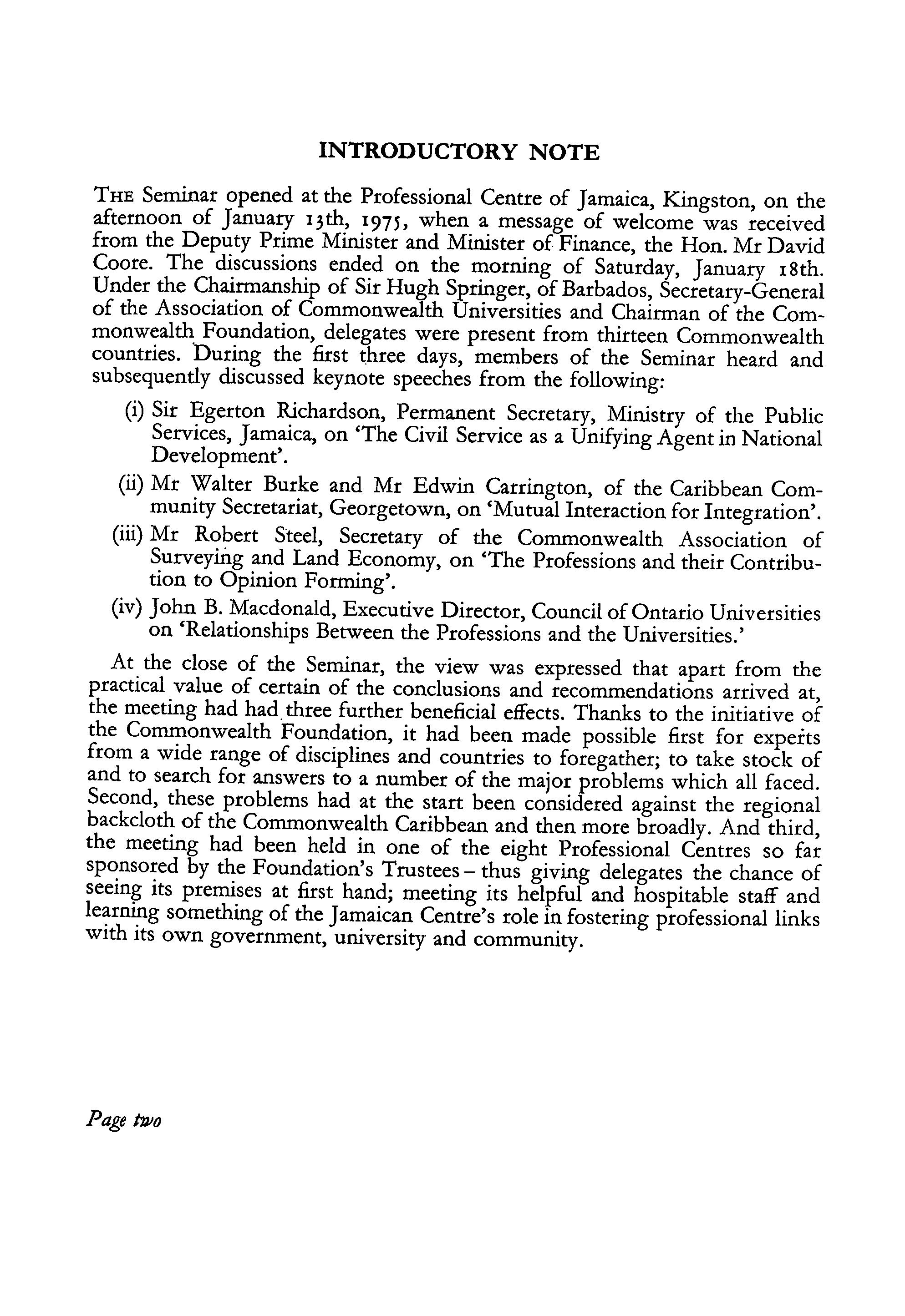
62 minute read
List of Delegates
INTRODUCTORY NOTE
THE Seminar opened at the Professional Centre of Jamaica, Kingston, on the afternoon of January 13th, 1975, when a message of welcome was received from the Deputy Prime Minister and Minister of Finance, the Hon. Mr David Coore. The discussions ended on the morning of Saturday, January i8th. Under the Chairmanship of Sir Hugh Springer, of Barbados, Secretary-General of the Association of Commonwealth Universities and Chairman of the Commonwealth Foundation, delegates were present from thirteen Commonwealth countries. During the first three days, members of the Seminar heard and subsequently discussed keynote speeches from the following: Sir Egerton Richardson, Permanent Secretary, Ministry of the Public Services, Jamaica, on 'The Civil Service as a Unifying Agent in National Development'. Mr Walter Burke and Mr Edwin Carrington, of the Caribbean Community Secretariat, Georgetown, on 'Mutual Interaction for Integration'. Mr Robert Steel, Secretary of the Commonwealth Association of Surveying and Land Economy, on 'The Professions and their Contribution to Opinion Forming'. John B. Macdonald, Executive Director, Council of Ontario Universities on 'Relationships Between the Professions and the Universities.' At the close of the Seminar, the view was expressed that apart from the practical value of certain of the conclusions and recommendations arrived at, the meeting had had ,three further beneficial effects. Thanks to the initiative of the Commonwealth Foundation, it had been made possible first for expefts from a wide range of disciplines and countries to foregather; to take stock of and to search for answers to a number of the major problems which all faced. Second, these problems had at the start been considered against the regional backcloth of the Commonwealth Caribbean and then more broadly. And third, the meeting had been held in one of the eight Professional Centres so far sponsored by the Foundation's Trustees - thus giving delegates the chance of seeing its premises at first hand; meeting its helpful and hospitable staff and learning something of the Jamaican Centre's role in fostering professional links with its own government, university and community.
Advertisement
Page two
TABLE OF CONTENTS
Page Terms of Reference of the Foundation .. .. .. ..
.. i
Introductory Note .. .. .. .. .. .. .. .. 2
List of Delegates .. .. .. .. .. .. .. .. 4
Recommendations and Conclusions from the Seminar .. ..
.. 7
Seminar Proceedings .. .. .. .. . . ..
•. 12
Annex A - Keynote address by Sir Egerton Richardson .. .. 34 Annex B - Address by Mr W. A. Burke and Mr E. W. Carrington .. 46 Annex C - Address by Mr R. Steel .. .. .. ..
.. 58 Annex D - Address by Dr J. B. Macdonald .. .. .. .. 74 Previous Foundation Publications .. .. .. .. ..
.. 85
Page three
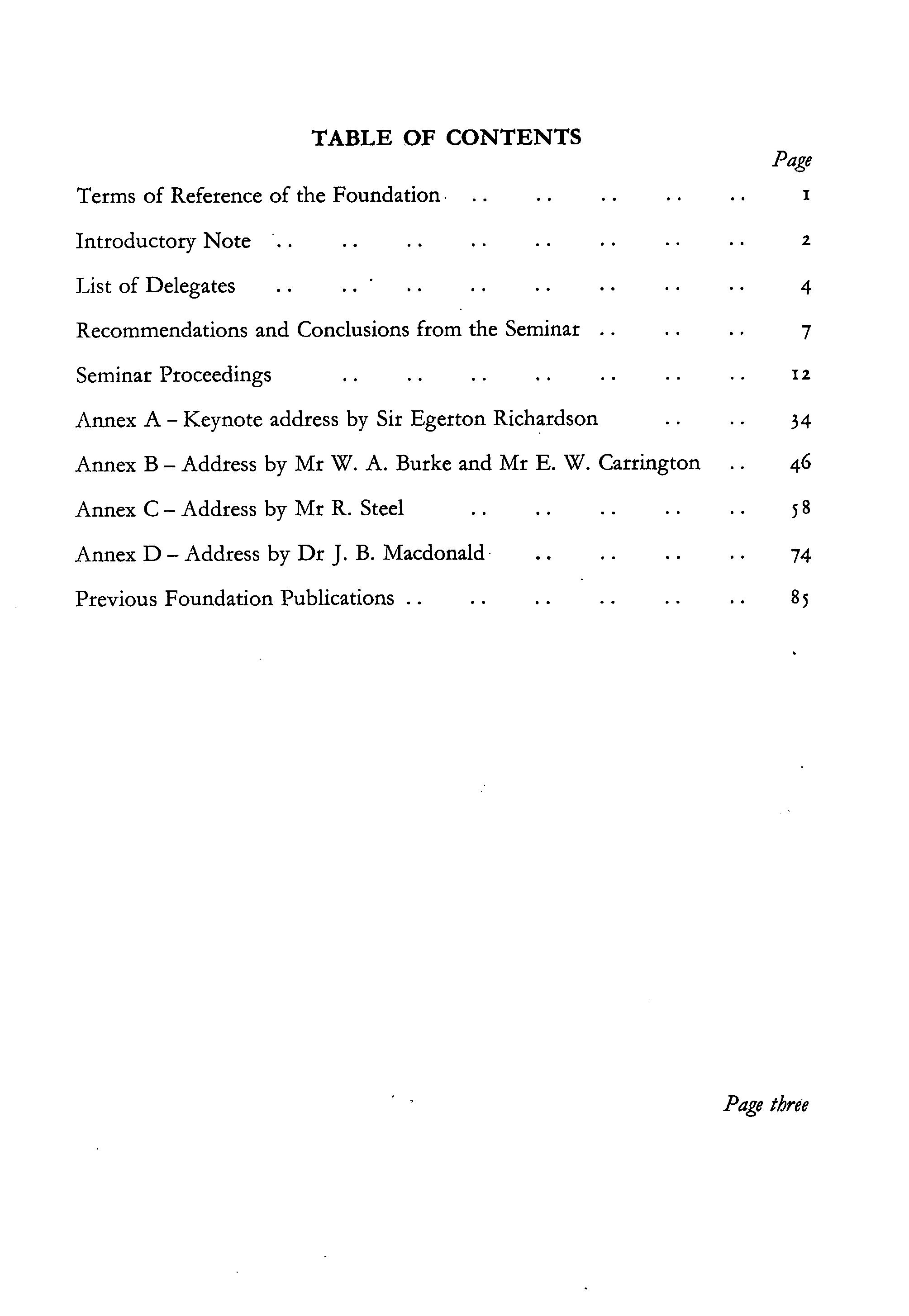
LIST OF DELEGATES
Chairman
SIR HUGH SPRINGER Chairman, Commonwealth Foundation
SIR EGERTON RICHARDSON
MR W. A. BURKE
MR E. W. CARRINGTON
DR JOHN B. MACDONALD
MR R. STEEL
MR A. L. ADU
DR D. K. AMIEL DR G. G. BOICK
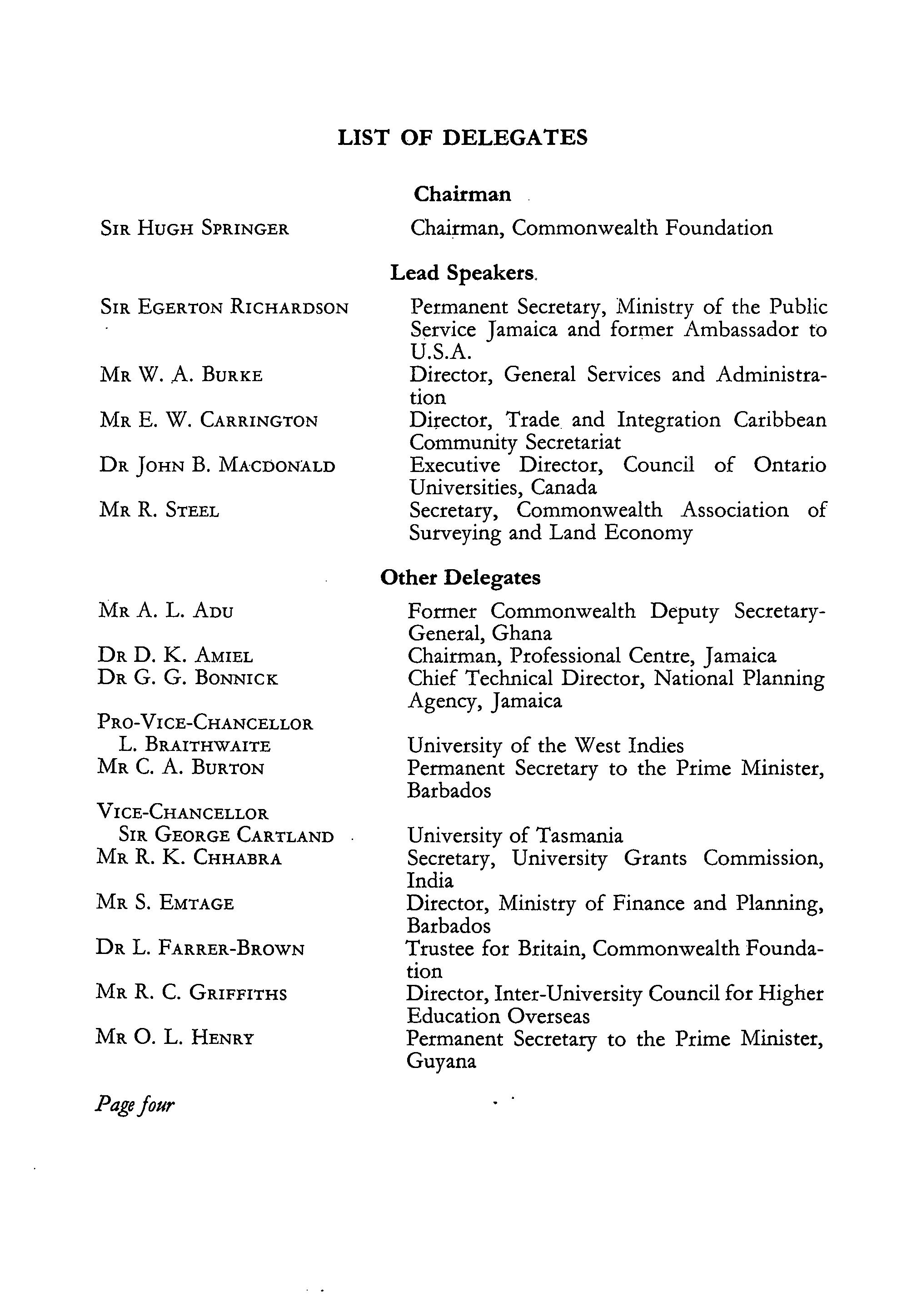
PRO-VICE-CHANCELLOR
L. BRAITHWAITE MR C. A. BURTON
VICE-CHANCELLOR
SIR GEORGE CARTLAND MR R. K. CHHABRA
MR S. EMTAGE
DR L. FARRER-BROWN
MR R. C. GRIFFITHS
MR 0. L. HENRY
Page four
Lead Speakers.
Permanent Secretary, Ministry of the Public
Service Jamaica and former Ambassador to
U.S.A.
Director, General Services and Administration
Director, Trade and Integration Caribbean
Community Secretariat
Executive Director, Council of Ontario
Universities, Canada
Secretary, Commonwealth Association of
Surveying and Land Economy
Other Delegates
Former Commonwealth Deputy Secretary-
General, Ghana
Chairman, Professional Centre, Jamaica
Chief Technical Director, National Planning
Agency, Jamaica
University of the West Indies
Permanent Secretary to the Prime Minister,
Barbados
University of Tasmania Secretary, University Grants Commission, India Director, Ministry of Finance and Planning, Barbados Trustee for Britain, Commonwealth Founda- tion Director, Inter-University Council for Higher Education Overseas Permanent Secretary to the Prime Minister, Guyana
MR D. INGRAM Managing Editor, Gemini News Service, U.K. VICE-CHANCELLOR D. IRVINE University of Guyana and Resident Rep- resentative of the Commonwealth Secretary- General. MR L. W. JOHNSON Director-General, The Australian Develop- ment Assistance Agency. Former Adminis- trator of Papua/New Guinea PROFESSOR R. JOLLY Director, Institute of Development Studies, Sussex, U.K. MR LEONG SlEW TIM Chairman, Professional Centre, Singapore MR J. W. MACNAUGHTON Senior Liaison Officer, Non-Governmental Organizations Division, Canadian Inter- national Development Agency
PRO-VICE-CHANCELLOR S. L. MARTIN H.E. THE HON. T. H. MCCOMBS University of the West Indies New Zealand High Commissioner in London and Trustee for New Zealand and Western Samoa, Commonwealth Foundation. Former Chancellor, University of Canterbury, Christ- church, New Zealand PROFESSOR G. E. MILLS Head, Department of Government, University of the West Indies MR L. HAMILTON-MURRAY Chairman, Professional Centre Trinidad and Tobago SIR FRED A. PHILLIPS Former Governor of St Kitts-Nevis-Anguilla
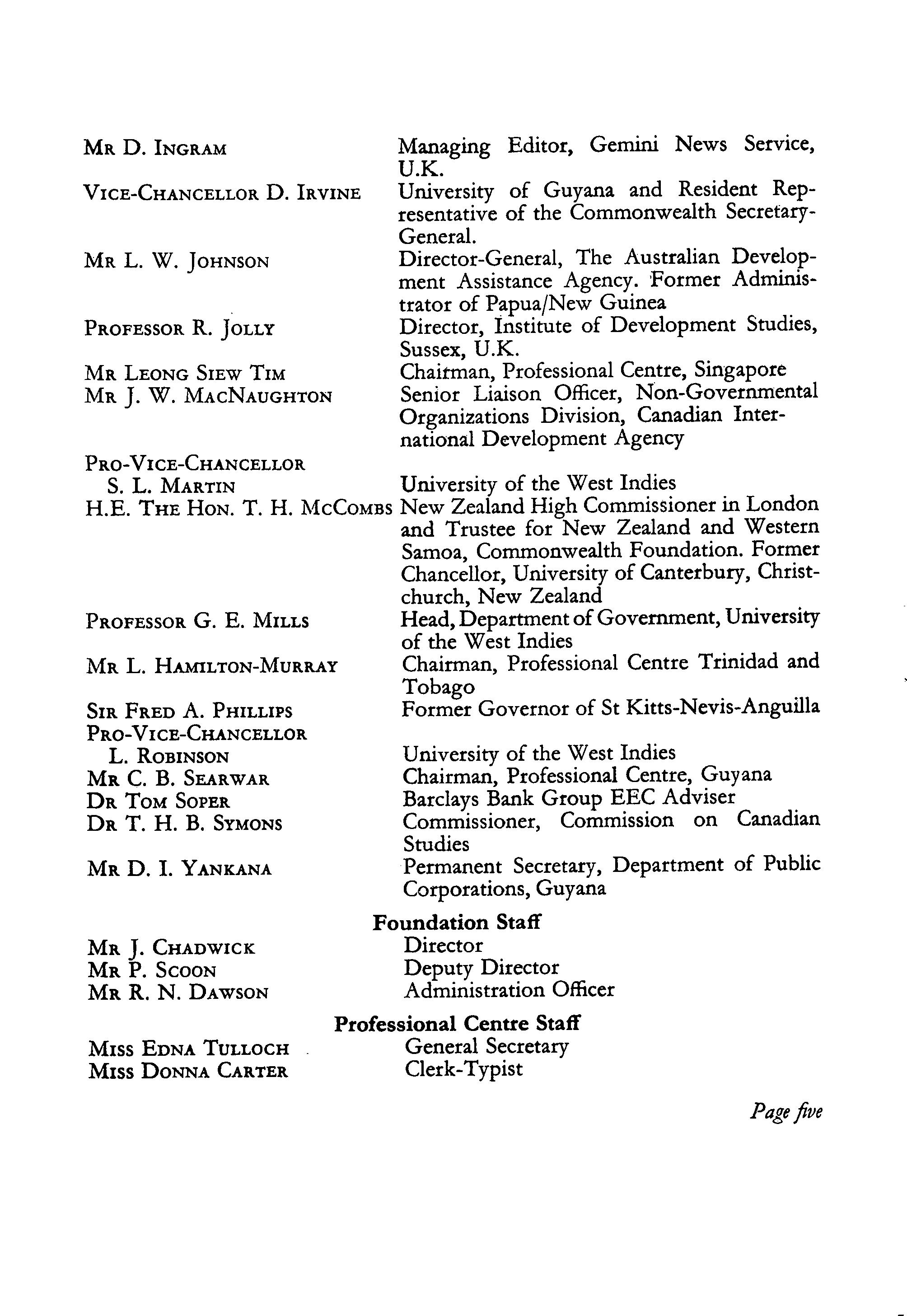
PRO-VICE-CHANCELLOR
L. ROBINSON MR C. B. SEARWAR
University of the West Indies Chairman, Professional Centre, Guyana DR DR TOM SOPER T. H. B. SYMONS Barclays Bank Group EEC Adviser Commissioner, Commission on Canadian Studies MR D. I. YANKANA Permanent Secretary, Department of Public Corporations, Guyana
Foundation Staff
MR J. CHADWICK MR P. S COON
MR R. N. DAWSON Director Deputy Director Administration Officer Professional Centre Staff
Miss EDNA TULLOCH General Secretary Miss DONNA CARTER Clerk-Typist
Page five
Observers at the session on Professional Associations and Centres
MRS A. ALBERGA Secretary, Chartered Secretaries and Administrators in Jamaica DR MATHEW BEAUBRUN President, Commonwealth Medical Association MRS C. P. FRAY Secretary, Commonwealth Library Association MR B. NELSON Treasurer, Institution of Engineers (Jamaica) MRS A. ROBERTSON President, Jamaica Library Association DR M. SIEVWRIGHT President, Nurses' Association of Jamaica MR K. WILLIAMS Vice-Chairman, Professional Centre of Jamaica
Page six.
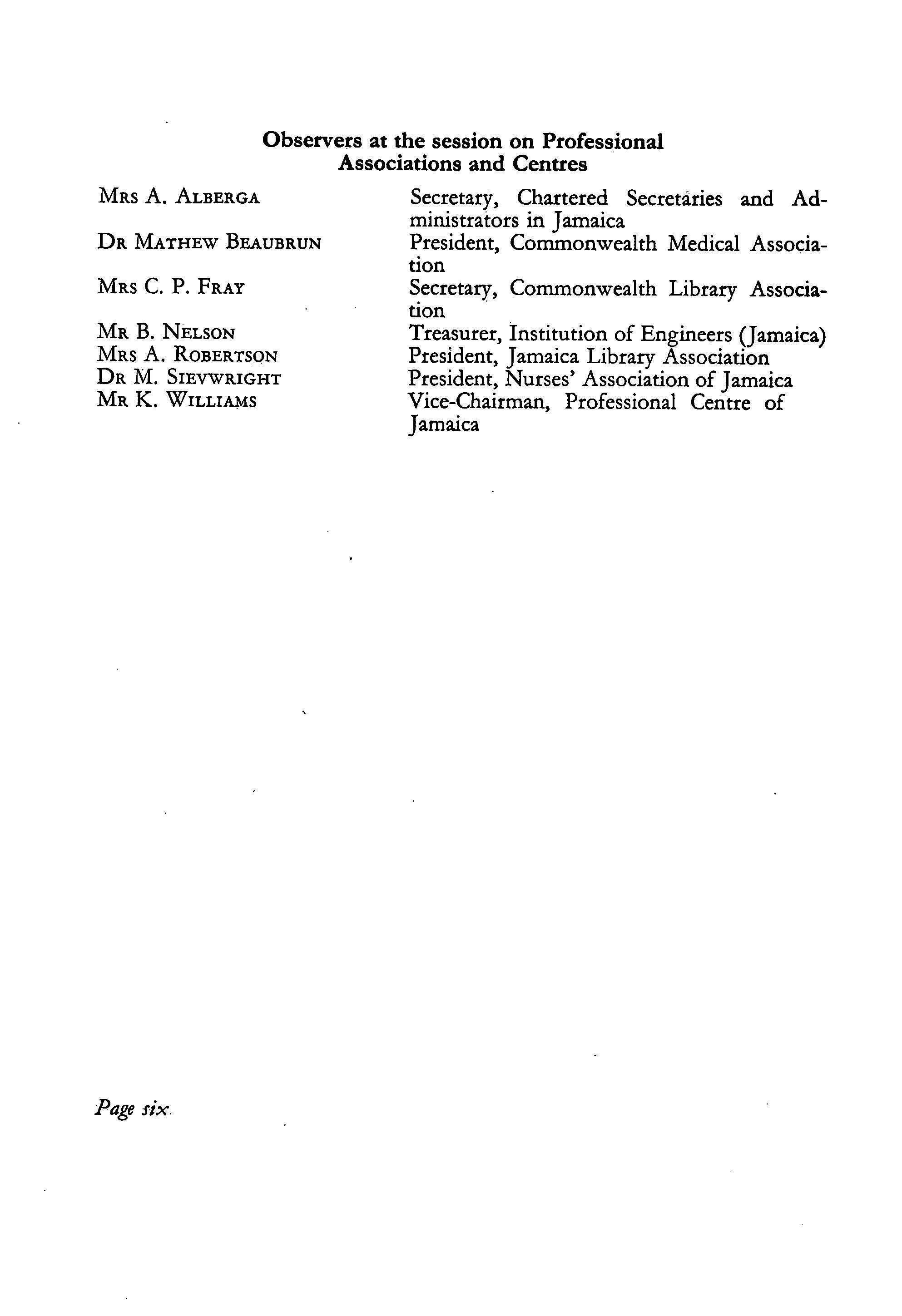
RECOMMENDATIONS AND CONCLUSIONS FROM THE SEMINAR The week-long discussions of the Seminar took place against the background of an unremitting increase in the complexity of mankind's problems and of a world-wide need to restructure national economies in the light of the oil crisis. The growth and application of knowledge in itself threw up problems to which individuals, however gifted, or single organizations, however powerful, could no longer alone find solutions. Inevitably, changes must occur in the economies of countries rich, and poor. This in turn posed problems for governments, universities, the professions and the business and financial sectors alike. It was the view of the Seminar that, as the store of knowledge grew and problems increased in complexity, so governments would inevitably become more and more involved in the day-to-day lives of their communities. Their civil services could not hope, unaided, to advise. Hence, the need for increasing consultation and cooperation between Ministers, their advisers, university and professional experts and leaders from the private sector, including business and trade unions involved therein. Only through such interaction could governments ultimately take policy decisions based on the fullest understanding of the problems facing them, and in the widest public interest. It was against this background that delegates addressed themselves to the questions how best mutual interaction could be initiated and improved; and what roles in what particular spheres governments, professions and universities and individuals within each could most usefully perform. At an earlier Seminar held under Commonwealth Foundation auspices in 1973, it had been recommended that closer inter-university co-operation within the Commonwealth was needed, including a marked increase in the exchange of personnel. The theme for the current Seminar embraced a far broader spectrum of the national community. It thus seemed necessary to emphasize the role which universities could best perform in a rapidly changing world.
Members of the Seminar found themselves in broad agreement that a university's primary functions were: to provide teaching ranging from the highest to the undergraduate level; to educate generalists and potential specialists alike; to undertake pure and applied research. While adapting themselves in the short-term to meeting urgent contemporary needs such as requests from Governments, public corporations and other sectors of the community for the loan of personnel or for advice in finding solutions to problems of the hour; the universities should not lose sight of their Page seven
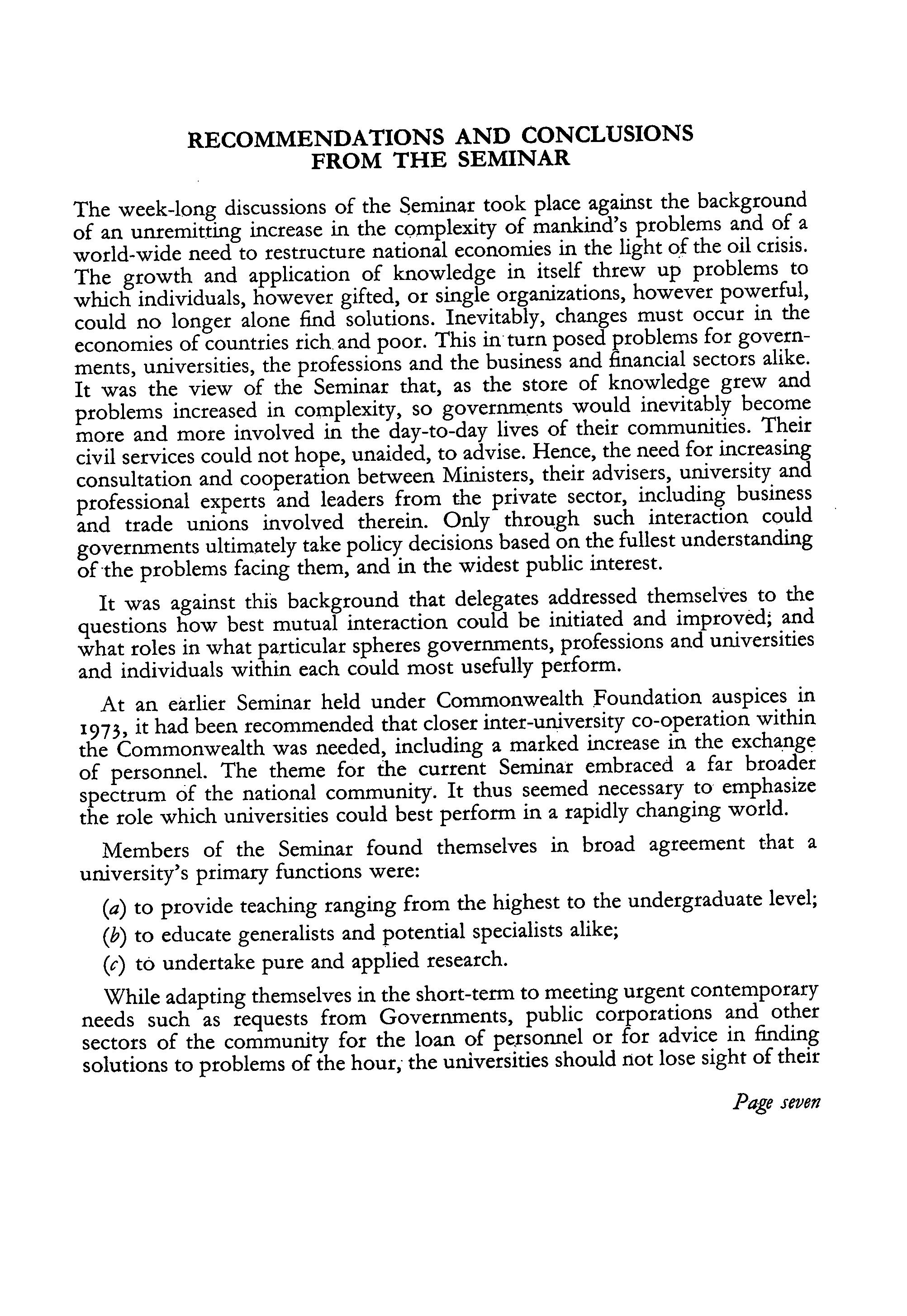
primary long-term role of conducting education and research at the highest level. Turning to the role of the professions and the part which their individual members, whether within or outside the public sector could play in increasing co-operation with governments and universities on the one hand and with public corporations, business and industry on the other, members of the Seminar recorded how impressed they had been by the achievements to date of the Commonwealth Professional Associations and National Professional Centres (at one of which their meeting had been held) in promoting increased co-operation between professional bodies and individuals, nationally, regionally and Commonwealth-wide. They were struck by the evidence presented of voluntary service by certain professional bodies to their own communities and by the support given to Centres by newer national bodies such as professional social workers, whose activities related closely to problems of lowerincome groups. At the same time, they noted the hesitation of professions in some countries to proffer expert advice to governments, and the apparent reluctance of the latter in other countries to seek such advice. The broad conclusion of the Seminar was thatin some countries a higher degree of co-operation currently existed between universities and governments than between governments and the professions themselves. They recommended that the professions should be prepared to commission expert studies affecting the development of their countries. The Seminar then turned to consider how best mutual interaction could be furthered and agreed upon the following conclusions and recommendations. To them, however, they added the riders that in the last resort each country must be left to work out its own solutions in the light of its own political, economic and cultural backgrounds and that, however admired, the British heritage and British conventions as affecting civil services, universities and professiôth alike, had proved when transplanted to be in need of modifications in varying degrees to suit local circumstances. x. Since the effective application of knowledge, experience and technical expertise by scarce personnel to complex problems affecting society was of paramount importance, it had become urgent to develop ways and means of co-ordinating programmes with the aim of encouraging greater mobility of scarce personnel among governments, universities, the professions, and business. This should take place at all levels: nationally; between more and less developed countries in the Commonwealth, and especially between developing countries themselves. z. It was clear, however, that even existing programmes or ad boc interchanges posed problems, particularly in the university field, which had to be Page eight
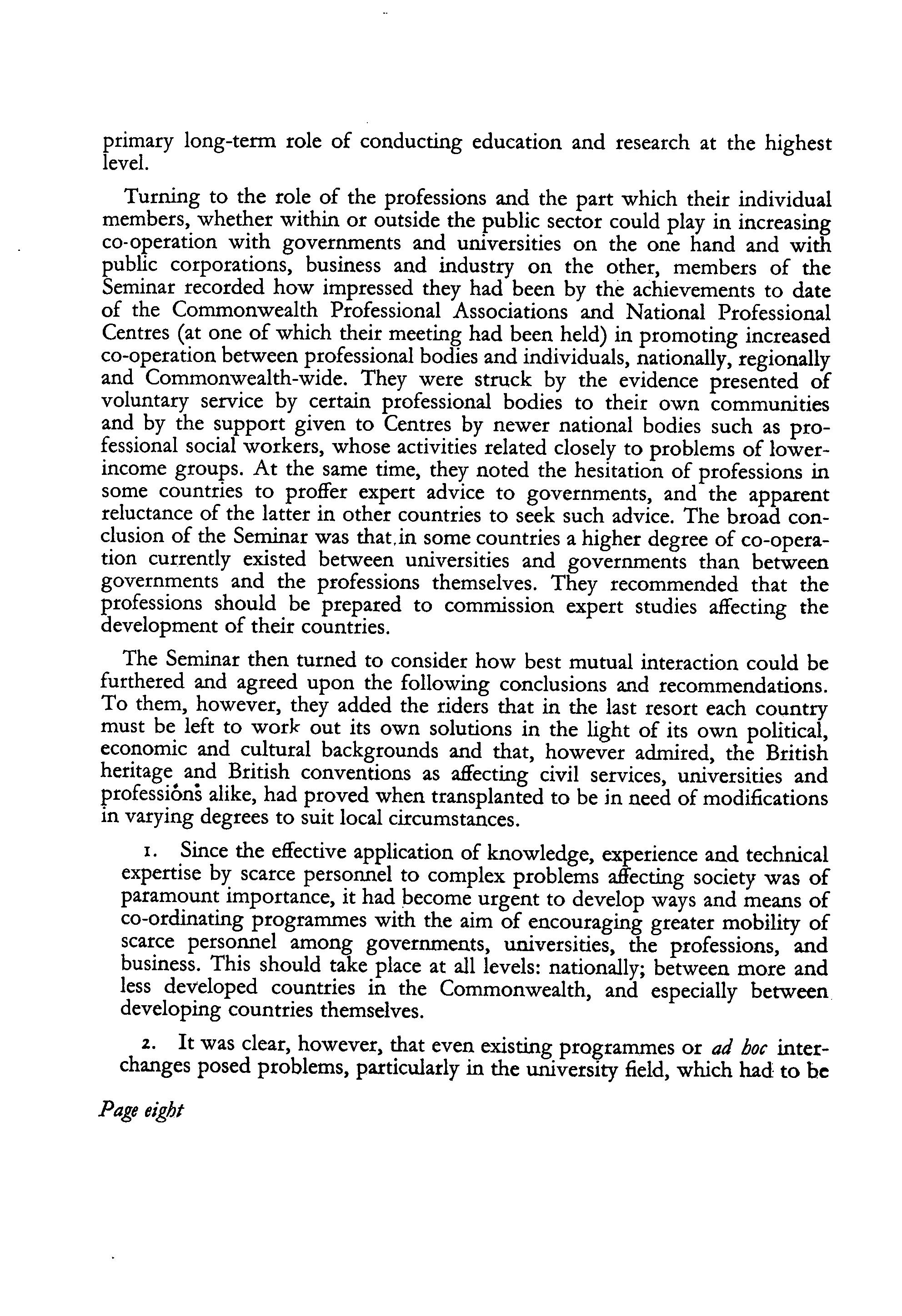
resolved before wider interchanges could be introduced. It was easier in some countries, for instance, to attract a civil servant to a university posting than vice versa, while in others, the reverse was the case. As the demands made on them by governments and public corporations grew, universities found themselves facing increased financial burdens. Temporary teaching replacements were difficult to find and inevitably proved costly. It was desirable that such establishment issues be examined urgently at both national and regional levels and early solutions found. In an effort to foster mutual interaction and the identification and protection of the public interest, governments should be persuaded to accept that universities, the professions and business were concerned with the national development and planning processes. Thus, collectively or individually academics, professionals and businessmen should be invited to involve themselves at the earliest planning stage in policy formulation affecting the public interest and be encouraged to provide expert and unbiased advice. It appeared however to some participants that, while such a system of collaboration and consultation was highly desirable and was indeed practicable in sectoral planning, e.g., Education, Health, Agriculture, Tourism, nevertheless the possibilities of involving private organizations and personnel in the central process of formulating the overall plan would be limited in most cases by the logistics of the situation and by political constraints. Recent changes within the world economy and the challenge to establish a new economic order presented all countries of the Commonwealth, richer and poorer, with the need to rethink current training, retraining and research programmes. Governments should invite the co-operation of universities and professions in adapting training courses and textbooks and in involving themselves in specific applied research programmes in order to assist in the shorter-term in a co-ordinated attack on the new and urgent problems now facing their communities. . From this it followed that all must take a new hard look at acceptable standards of competence in various professional fields and that all should bring laymen increasingly into government and non-government committees and councils involved with planning and decision-making processes affecting the pattern of development and the quality of life. Professional bodies should actively offer advice to governments instead of waiting to be consulted. Both professionals and academics would increasingly need to take part in public debates with a view to informing and influencing public opinion. Both professionals and academics would increasingly need to participate in public debate on important issues, through improved public relations programmes. All appropriate steps should also be taken to inform the public about the
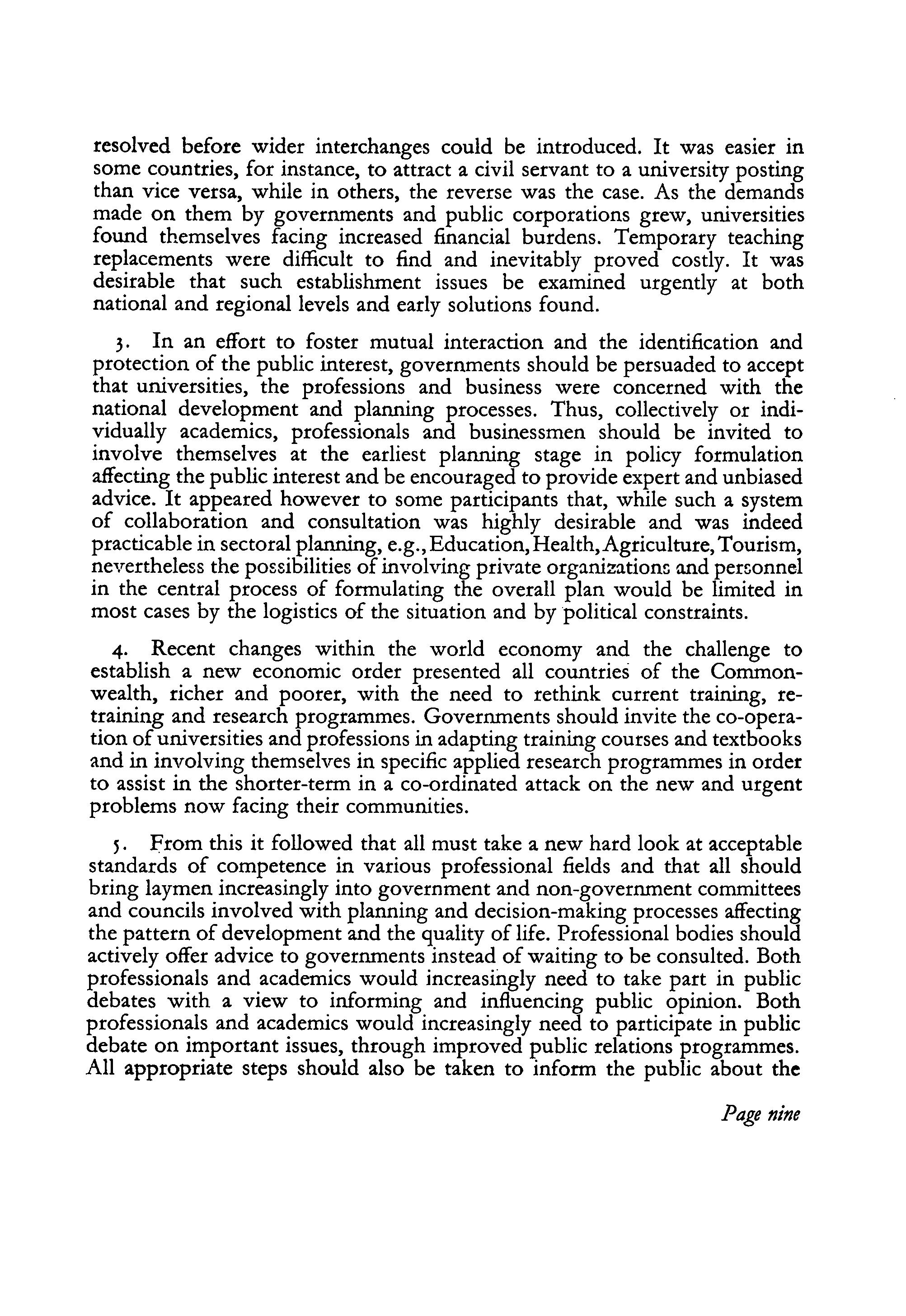
Page nine
activities undertaken and the services offered by the professions and the Universities. 6. The use and movement within the Commonwealth of scarce manpower resources was a persistent problem requiring examination at the highest level. Leaving aside the reasons for, and the costs and benefits of, the brain drain, which differed in differing areas of the Commonwealth, it seemed clear that the more developed countries benefiting from the movement of skilled personnel in their direction should in return so adapt their aid programmes as to provide a measure of compensation and, where appropriate, assistance in the gap-filling process. While recognizing that there already existed areas of co-operation between the universities and the professions the Seminar felt that there was need for even greater collaboration in filling manpower gaps. At the same time, government should be urged to review the use currently made of available skills, and to include in their advisory or implementing machinery those who had a contribution to make but were not as yet involved. 8. With the growing overlap between the public and private sectors, it was important that civil servants should be exposed to business administration and to problems arising in the areas of both national and international finance. Attachments to the private sector would give civil servants both experience and insight into these, matters which would add considerably to their competence in dealing with the critical economic problems that the world now faced. The inter-disciplinary team approach to problem-solving was in-. creasingly used in developed as well as in developing countries. As a means of ensuring the success of this approach the professions had a special responsibility for advising on the content of training courses for sub-professionals as well as for helping their sub-professional colleagues generally. Opinion was, however, divided as to whether such courses should be held in universities or in other educational institutions. While in the final analysis, each country would have to decide where such courses should be held, it was agreed that universities must be associated with them. io. To avert the danger of alienating public opinion, the professions needed to have increasing dialogue with the media. Unless there was some understanding on the part of the public of the role and work of the professions the latters' effectiveness, particularly in developing countries, would remain in doubt. To some degree similar considerations applied to universities. i i. With the rapid expansion of knowledge there was a need for enlarged programmes of mid-career retraining. These should involve high level
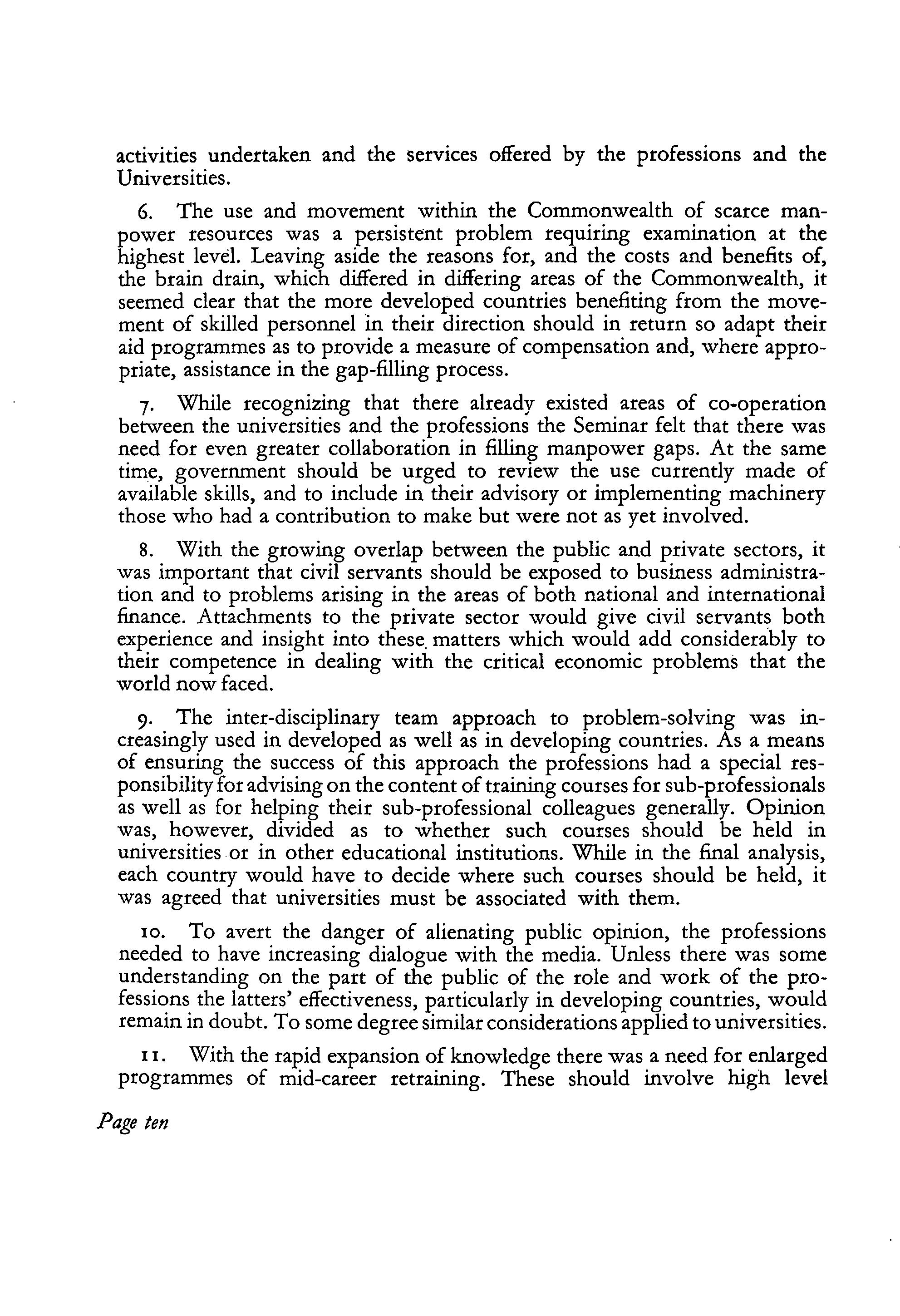
Page ten
administrators, academics, professionals, as well as leaders in the business, commercial, banking and trade union fields.
To obviate the risk of a fossilization of standards, it was necessary for professionals, civil servants and academics to review what should be the acceptable levels of competence in various professional fields. This was especially important in developing countries where there was a tendency for professionals to be rigid in their demands that training standards be comparable, if not identical, with those obtaining in developed countries. The Seminar felt that one of the key factors in determining an acceptable level of training should be the current and foreseeable needs of the country concerned. At the same time it was emphasized that while course content might differ from country to country, high standards must always be maintained.
There was need for both academics and professionals to concentrate their efforts on serving the public interest; the seminar noted the arguments for public representation on the governing bodies of the professions, and alternative methods (such as references to the Monopolies Commission in the UK) of dealing with practices that might operate against the public interest.
Finally, the Seminar endorsed three further recommendations emerging from the discussions: That it might be useful for the Commonwealth Foundation to take the initiative in convening a meeting of those concerned with or interested in the work of university grants committees throughout the Commonwealth with a view to examining and exchanging views and experiences on the structure and methodology of such bodies. That the Commonwealth Foundation should consider the possibility of encouraging the growth of a new or modified type of Professional Centre suited to the needs of the professions and the public in remoter or less developed areas of the older Commonwealth. That the Chairman and Trustees of the Commonwealth Foundation might organize, perhaps in 1976, a meeting of representatives of Professional Centres and others interested in this concept to review achievements, problems and mutual interaction in the professional field throughout the Commonwealth, including the inter-Commonwealth use of scarce skilled manpower resources. At the conclusion of the Seminar Sir Fred Phillips expressed the sentiments of all those present in thanking the Commonwealth Foundation for its initiative in having brought together so mixed and skilled a group of experts. The meeting had helped a number of busy and influential men from widespread areas of the Page elpven
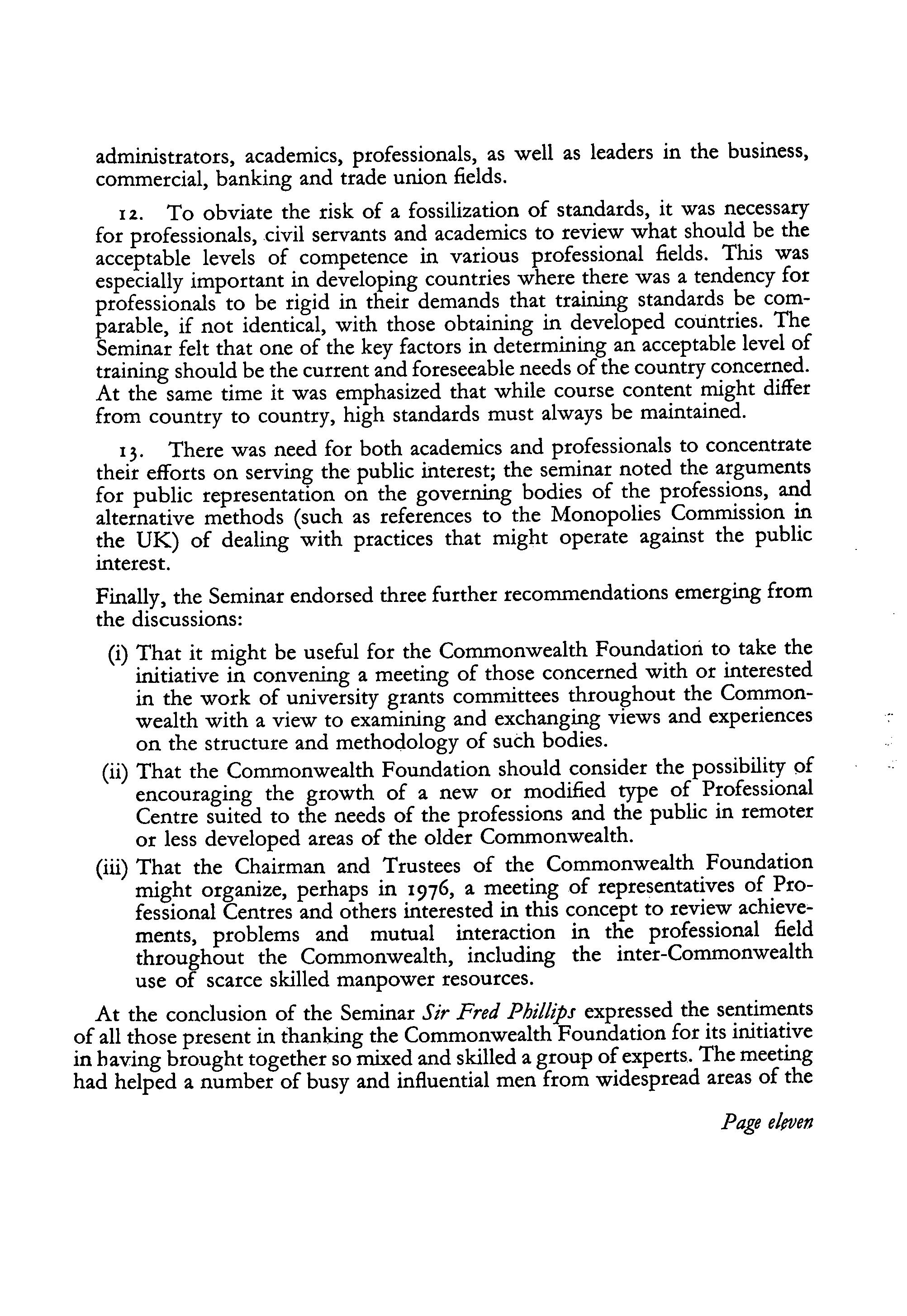
Commonwealth to pause for a while: to take stock of the problems which all faced and to share each others' thoughts and experiences.
After the Chairman had expressed warm thanks to the President, Secretary and staff of the Professional Centre; to the ladies who had voluntarily assisted with the hospitality programme; to the Vice-Chancellor at the Mona Campus and to officers of the Foundation for the part each and all had played in ensuring the success of the Seminar Mr A. L. Adu, on behalf of the delegates, in turn thanked Sir Hugh Springer for his courteous and effective handling of the meeting.
Kingston, Jamaica.
January i8th, 1975.
SEMINAR PROCEEDINGS
Opening of the Seminar
In the absence of the Deputy Prime Minister, Sir Egerton Richardson read a statement on his behalf. In this the Deputy Prime Minister expressed his regret at his inability to be present personally at the opening of the ceremonies due to an unavoidable last-minute engagement. Through Sir Egerton, he welcomed the delegates to Jamaica. The Government were aware of and supported the Commonwealth Foundation as an agency for change and development. Its work was of great relevance to the Commonwealth and it was only recently that the Heads of Government had re-emphasized their confidence in its activities. Mr Coore would look forward to learning of the outcome of the discussions at the Seminar and hoped that they would point the way to closer co-operation between Commonwealth Governments, Professional Centres, Universities and Members of the Professional Community.
In his opening remarks the Chairman, Sir Hugh ipringer, requested Sir Egerton Richardson in the name of all delegates present to convey to the Deputy Prime Minister his and their thanks for his message, coupled with the regret of the meeting at his inability to be present personally. The Chairman then also welcomed in the name of the Commonwealth Foundation those who had travelled from many parts of the Commonwealth to attend. At the same time he conveyed the regrets of Dr James Maraj, of the Commonwealth Secretariat; Mr R. Bain, Secretary to the Cabinet, Bahamas; and of Mr Carrington and Mr McIntyre, of the Caricom Secretariat at their inability to be present. He went on to express the Foundation's warm thanks to the President, Secretary and Staff of the Professional Centre for all they had done to assist in the preparation of the Seminar.
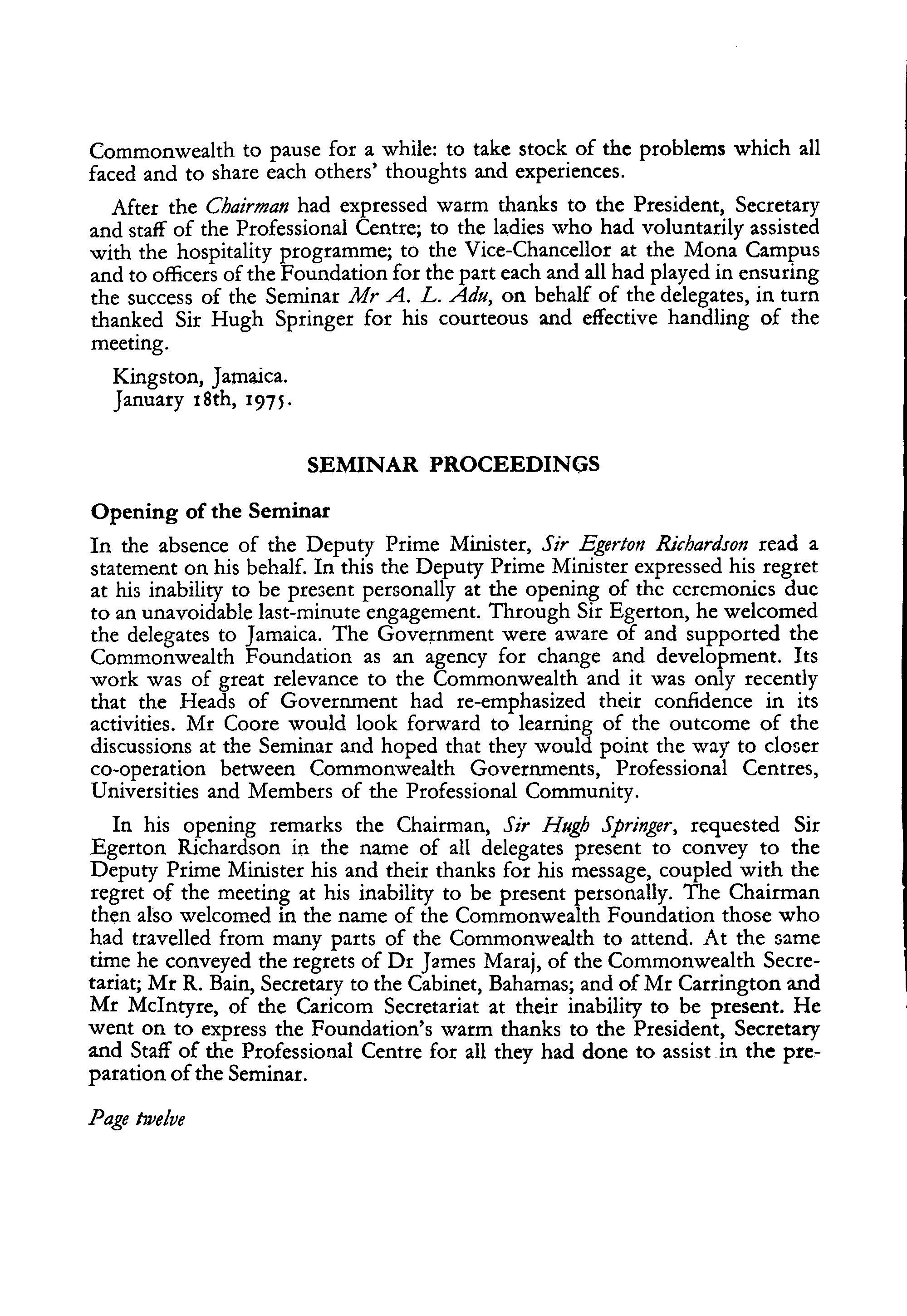
Page twelve
While not deliberately planned as such, the meeting should prove a logical follow-up to two earlier Foundation sponsored Seminars - the first in Singapore in 1971 in the course of which the professions had taken a hard look at themselves and at their role in Society; and the second at Sussex where the Universities had considered their own responsibilities in relation to the professions and to the development process generally. It would be the task of this third Seminar to examine the inter-relationship between Civil Services, Professions and Universities within the Commonwealth.
The Chairman then invited Sir Egerton Richardson to deliver his keynote address.
A. THE CIVIL SERVICE AS A UNIFYING AGENT IN NATIONAL DEVELOPMENT
After Sir .Egerton Richardson had presented and summarized his paper (the text of which will be found at Annex A) a general discussion followed of which the succeeding paragraphs provide a summary.
Expressing the concerns of the less developed countries in the Caribbean Sir F. Phillips suggested that the shortage of professional manpower, particularly in medical and agricultural departments of the Civil Services, could be made good by secondments from more developed countries in the area.
For Guyana, Mr D. L. Henry commented that his Government looked on the national development process not only in material terms but in relation to education and social welfare. Thus, his Government saw a role for the University in the context of the national development plan. The question was how co-operation between Universities and Governments could be improved. The latter all too often tended to keep their Universities at arm's length until the need for advice had grown urgent. Such attitudes could only increase the academic's sense of isolation.
Continuing this theme, Sir C. Cartland saw four ways in which Universities cold be of broad help in the national development process -
First: by tailoring training programmes to current and foreseen civil service needs.
Second: by directing research effort to practical short-term issues.
Third: through the loan of academic experts to civil services - notably, economists, scientists and agronomists. With this movement should go a counter-movement of civil servants into the University field, thus producing new stimuli and new viewpoints at mid-career on either side.
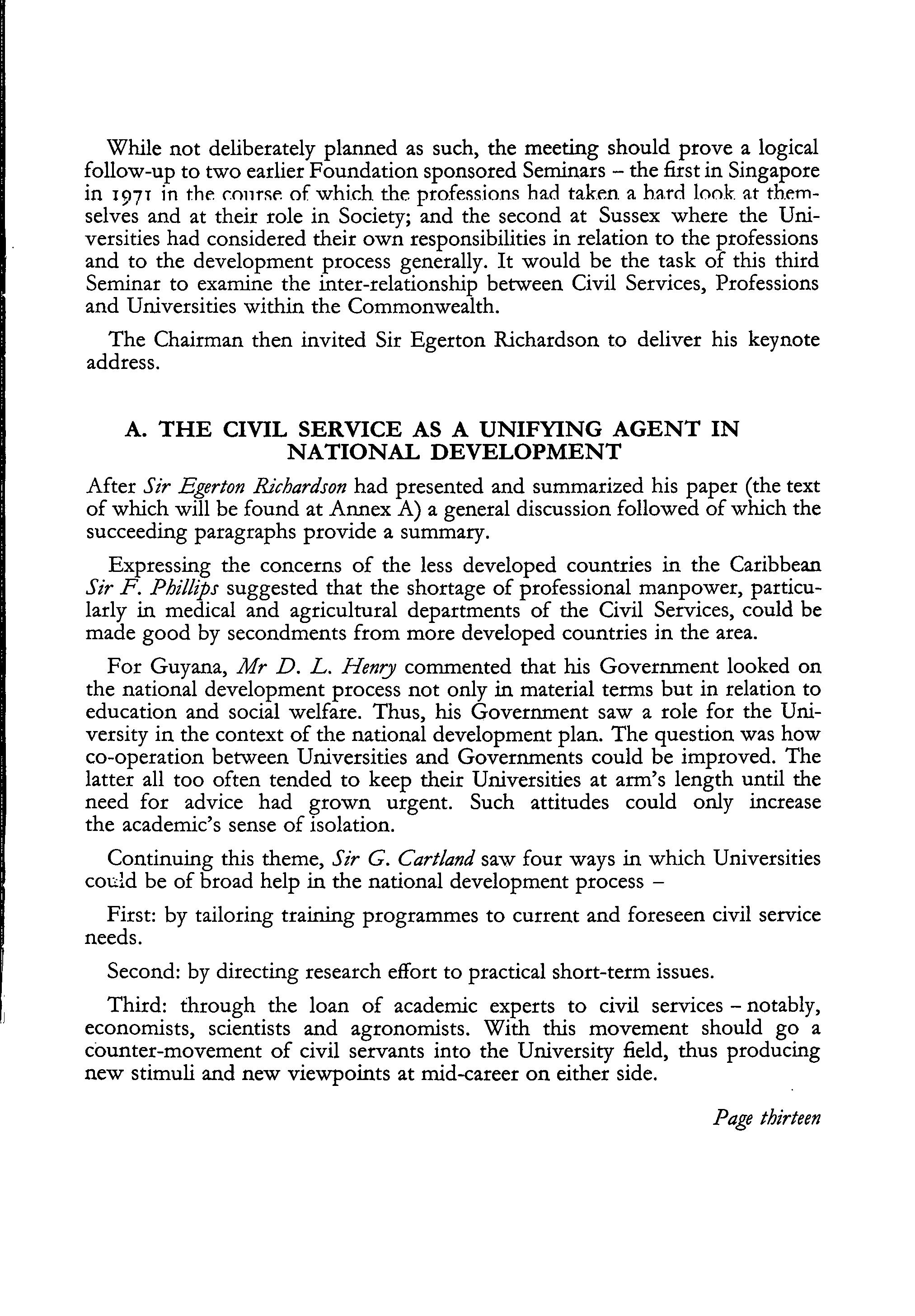
Page thirteen
Fourth: Universities could also assist with re-training in mid-career, particularly in relation to medicine. But such experiments could also bring in the generalist civil servant or even the generalist vice-chancellor. In the latter case, one might well ask to what degree older men in either the administrative or university services really understood the capacity of the computer.
For his part Dr T. Soper expressed the hope that the Seminar would also consider the problem of inter-changes between the civil service and the university world on the one hand, and the private sector on the other. Whatever was said in the key paper about the paramount role of civil services in newer and indeed older Commonwealth countries, there were still many such countries which operated primarily through a mixed economy. The private sector was involved in the decision-making process day by day in areas big and small. It was his feeling that the key speaker had perhaps laid too much stress on the importance of the civil service and of the role of politicians in the development process. Continuing, Prof. Mills expressed his support for the views so far advanced on the need for further inter-changes. But in this respect it was essential to keep in mind that problems of staffing and conditions of service invariably arose when inter-changes were under consideration as between the civil service proper and statutory bodies.
At this point, commenting on some of the remarks made, Sir B. Richardson stressed that the gap between the public and private sectors was constantly narrowing, at least in the Caribbean experience, and that the civil services were gaining control increasingly over the developmental and social sectors. Even the broad areas of culture and the arts were being brought increasingly under Government control, if only because of the failure of the private sector to stimulate these types of activity. In relation to inter-changes, which he personally favoured, one had to accept that there was a number of inhibiting factors such as lack of parity of incomes, pensions agreements and so forth.
Mr Leong stated that Singapore faced problems on the inter-change front similar to those described by the key speaker and others. There was a growing feeling in the private sector in his country that civil service involvement in the day-to-day life of the Community was becoming excessive. The time might come where the private sector would have to stand up against the risks of yet further encroachment. This led him to inquire what should be the role of the professions at a time where a collision course between the public and the private sectors seemed unavoidable.
Returning to the question of the growth of statutory corporations Mr Yank.ana mentioned that there were 19 publicly owned corporations in Guyana. If this development had occurred, it was because the private sector did not itself move fast enough in e.g. the agricultural and timber industries. Nor was it Page fourteen
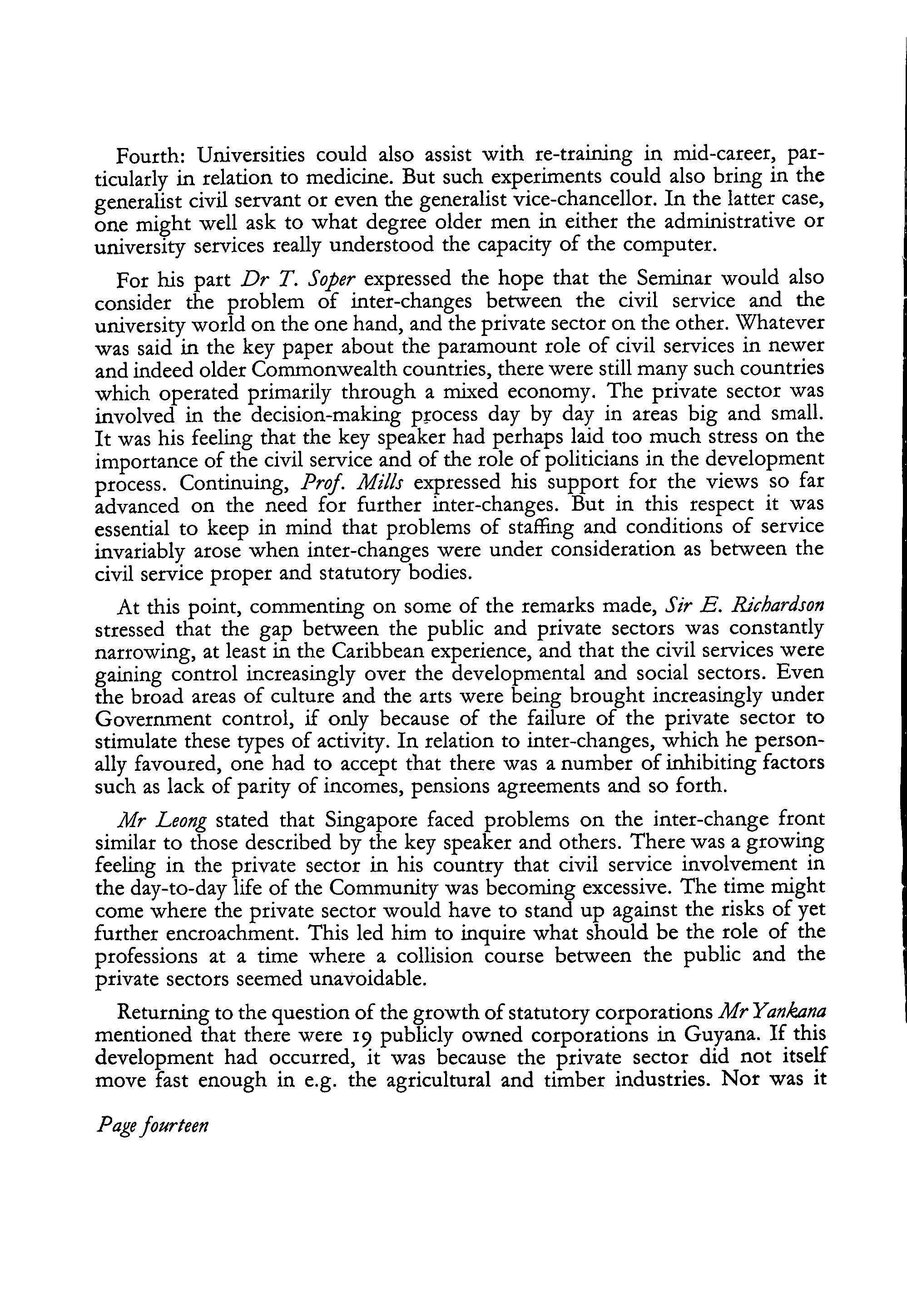
sufficiently alive to the need to modernize and expand the distributive and servicing industries. Even the provision of social benefits, such as insurance, was also of necessity increasingly becoming part of the public sector activities. One problem faced by developing countries was how to assess the value and viability of these public corporations. There would clearly be cases where the capital return on investment -perhaps in regard to the supply of electricity to scattered communities - would not be sufficiently attractive to the private sector. In such cases, there was nothing for it but for the State to intervene.
Speaking from his widespread African and International Agency experience Mr A. L. Adzi said that there had been throughout Commonwealth Africa the same movement as that described for the Caribbean in favour of an increase in Government intervention in the private sector. There had been a proliferation of statutory bodies. Increasingly the ideological view had developed that Governments must 'capture the commanding heights of society'. The effect of this broad movement had recently been that Governments were beginning to lag behind the economy if only through indigestion resulting from the swallowing of so many sectors of the economy itself. In his experience the institutional relationship between the Government Corporation concerned and the 'captured' sector of the private sector was extremely difficult to work out. Realizing this problem, the Government of Ghana, for instance, had recently appointed a committee of experts to examine the activities of the public corporations generally and to look for means of improving their efficiency. Against this background, academics and professional leaders had shown themselves eager to share in the national development process, but bewildered as to how precisely their advice could be fed into the state machine. It thus seemed to him a duty on civil services generally to bring the universities and the professions into the development processes. It had to be remembered that senior civil servants, despite the allegedly increasing power of politicians, did still take important decisions without first consulting ministers. There was thus all the more reason for such leaders in the administrative machine to take the initiative of consulting universities and professions as the need arose. It was perhaps true that academics made too great a fetish of 'academic freedom' and that they did not associate themselves enough with the development process. Nor sadly did students in Commonwealth Africa sufficiently concern themselves with the rural community development problems in their own countries. Academics must, to sum up, be seen to have become involved in national development problems.
As to the professional associations, his feeling was that these were not yet as well developed as they should be despite the efforts of the Commonwealth Foundation. They would grow in strength and stature only if they were consciously used by Governments and if they in turn became directly involved Page fifteen
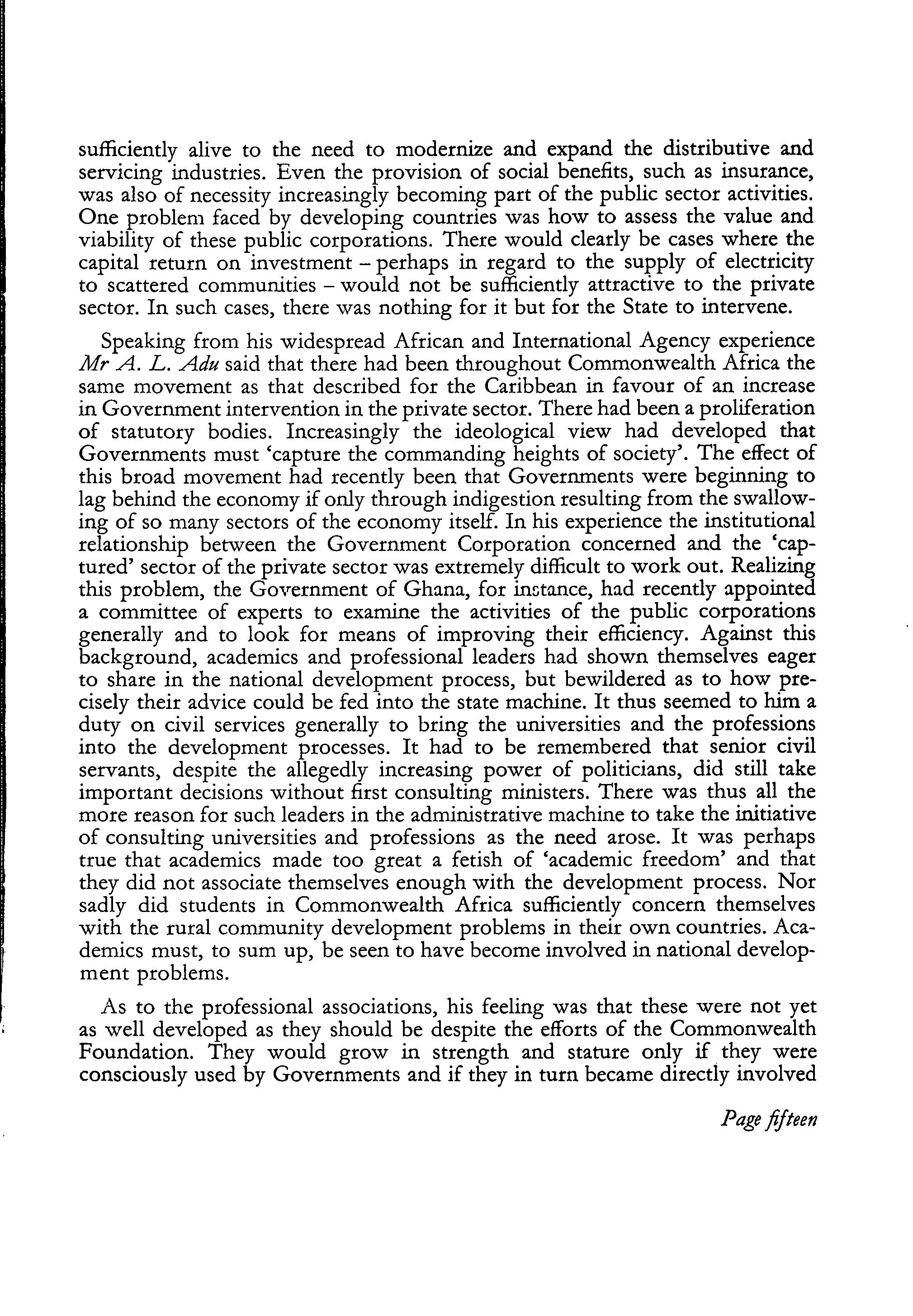
in the process of development. To sum up, as Mr Adu saw it, the burden was on the public services of the Commonwealth as the best organized parts of the national communities to date to encourage Universities and Professions to play their full part in national development planning. Only in this way could the as yet meagre expert resources of the newer world be fully and efficiently mobilized. Here again the mobility of individuals, coupled with proper conditions of service and a greater ease of inter-change, would prove significant.
For his part, Prof. Irvine expressed his agreement with the views advanced by Sir G. Cartland as to the desirability of inter-change between the private and the public sectors. Guyana had achieved some success in this respect. But it was clear that Universities must take a less archaic attitude regarding the make-up of their own governing bodies; and again inter-change must provide the necessary stimulus. Experience showed that it was easier to persuade civil servants to translate into the University field than vice versa. Again Universities should be invited to take part in development planning from the outset and not just at the stage where some particular research was called for.
Continuing, Mr Emtage reminded the meeting that professional associations were not just altruistic bodies. They had their own business interests to protect. There was a further broad problem facing developing countries: namely, that civil services were under-staffed professionally and that many professional bodies still contained an undesirably high percentage of expatriate 'transients'.
Turning to the role of a regional university such as the University of the West Indies, which served 14 territories, Prof. Martin emphasized the need for members of all disciplines on all campuses to speak with one voice despite the theoretical advantages of academic freedom. This applied particularly when a staff member from a campus country was working in a noncampus territory. There were dangers of a collision developing between technocrats and academics. Problems also arose, as had been mentioned, regarding differentials of salaries, pension contributions etc. as between the civil service and the University. Some thought might therefore be given by the civil services concerned to the nomination of supernumeraries within Universities. This would result in increased movement from the more highly to the less developed countries within a region. Or, again, small teams might be posted to non-campus territories from one of the campus countries. Such recommendations had recently been made by the U.W.I. but had been turned down by the University Grants Committee for lack of funds. The result had been a need to fall back on overseas technical aid. It would be interesting to know whether Caricom could prove of help in these particular areas.
Turning back to the role of the Civil Service Mr Grj71ths referred to changes in the make-up of administration at least in older Commonwealth countries.
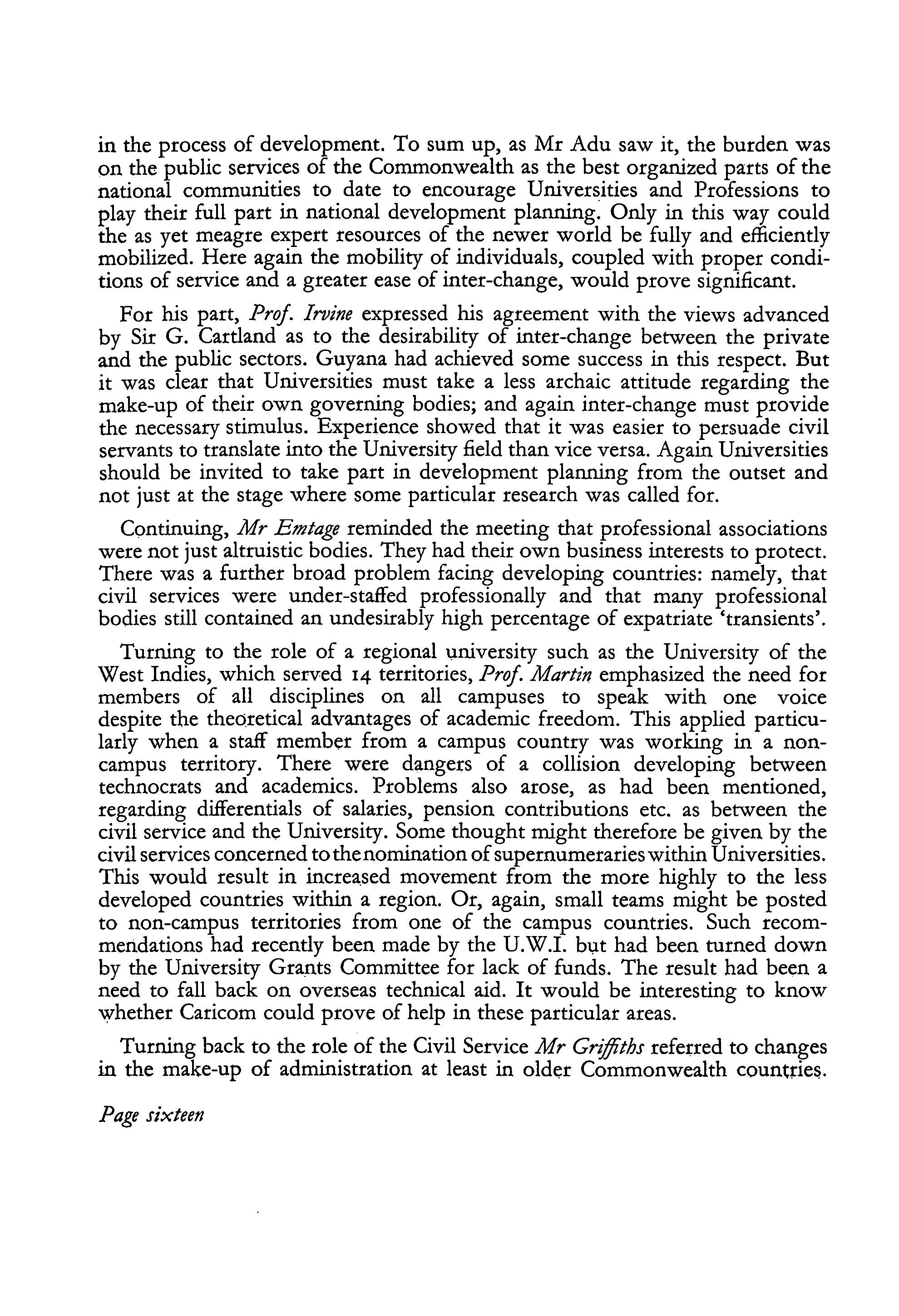
Page sixteen
It was evident that the power of the old administrative core of policy formers had been declining at the expense of the proliferating quasi-professional civil servant, and at that of the public corporations. The good in this process arose in the sense of the handing over of managerial functions to experts outside the civil service proper. The bad in it lay in the tendency of treasuries to find an excuse for fudging their manpower figures. Mr Murray referred to the need for a radical new look at the terms of civil service employment if proper movement between that sector and the professional and academic sectors was to be made easier. For his part Dr Symons suggested that some caution must be used before one accepted the assumption in Sir E. Richardson's paper that the public service was necessarily the best throughout the whole community. One could quote a number of examples to show that this was far from the case. The Civil Service in given circumstances could in fact be a great obstacle to public development. It would also seem that there had been an under-estimation of the role of the professions themselves. Certainly the public service was in the best position to 'capture the comanding heights'. But what was to happen when the only height left was in turn the public sector itself? Surely we should aim for a tripartite approach where the professional and university sectors grew in importance .Pari passu with the growth of civil services. The primordial role of a university remained that of producing the highly skilled manpower needed by society in general. It was interesting to note how young people viewed the public service today, at least in certain of the more developed countries. It was no longer in their opinion the necessary shortcut to the commanding heights. On the contrary, it was increasingly looked upon as the new-style establishment which was trying to manipulate both society and the individual. Sir G. Cartland suggested that we must remind ourselves that the State was also tending to move into the field of voluntary activity. This suggested a dangerous father-figure development. If prolonged, it could destroy initiative and goodwill, and finally erode the national character. Continuing, Dr Bonnick referred to the danger of the public service becoming a disunifying force through the sheer fact of bigness. This could lead to failure of responsiveness to the public's needs. There was thus a requirement for unifying and co-ordinating structures within each civil service as it grew in size. Here the University had an important watch-dog role as the civil service (which could not properly examine its own defects) continued to grow in size. Replying to the points made in discussion, Sir B. Richardson asked himself what indeed was the nature of the Government service. Why and on what grounds did more parts of the private sector move into or become absorbed by the public service area? He would look forward to a time when the civil service embraced more and more people with differing outlooks and views. Page seventeen
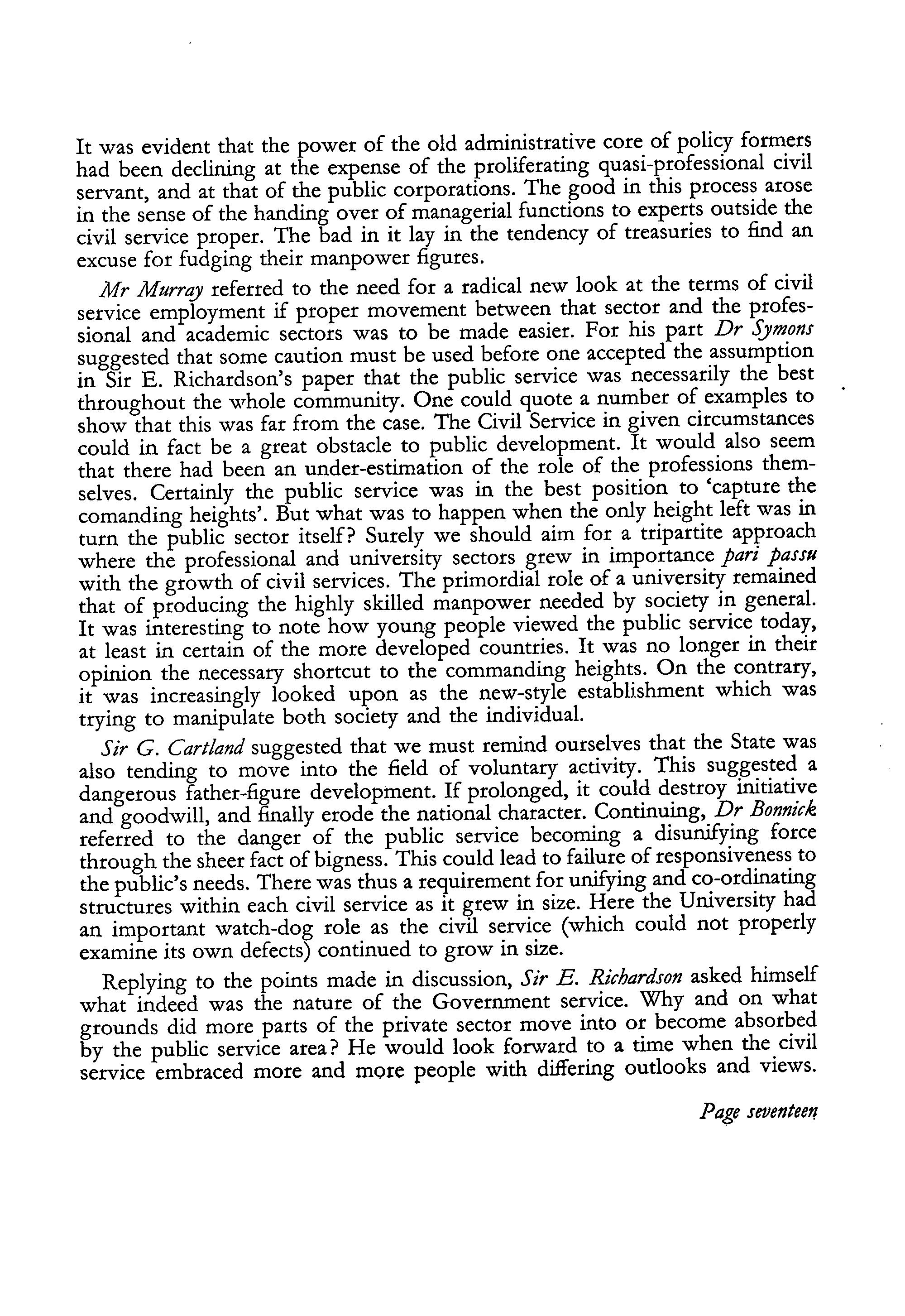
This would allow for broader and more continuing discussions with Universities and professions on such matters as conditions of service and would provide for expanded programmes of interchanges. He remained, however, unrepentant on his assessment that, in the Caribbean, Governments would encroach increasingly on the activities of the private sector.
B. MUTUAL INTERACTION FOR INTEGRATION A paper by Messrs Burke and Carrington
After Mr Burke had summarized the paper, a discussion was opened by Mr Johnson who referred to the problem of elitism in the Professions and in the academic world. He felt that this trend inhibited the development process and created a yet wider gap between the affluent and the poor. This was particularly noticeable in, for example, the medical profession. In this area, less developed countries had no immediate need of the more sophisticated aspects of medicine compared with the provision of health care in the rural areas. There was thus grave danger that Governments and Universities might fall into the trap of continuing to train a small elite at the expense of the need of the middle and lower grades of society. This in turn raised the question of the further training of ancillaries and technicians of all kinds. It was here that effort should be primarily concentrated. Agreeing with these comments Pro-Vice-Chancellor Brathwaite mentioned the desire of the U.W.I. to start a new faculty of community health in the Eastern Caribbean as well as to enter the field of technician training in engineering. But in both cases Governments had turned down the proposals for lack of funds. This inevitably raised tensions between the Government machinery and academics, but such tensions were bound to remain inevitable so long as funds were insufficient. Meanwhile Universities must take the long-term view of problems arising in such fields as the environment. They alone were in a position to think so far ahead since it was widely accepted that Governments for their part thought no longer than the next election.
Professor Irvine, for his part, referred to the problems of a regional university faced with a non-integrated educational system within the units making up its particular region. It was from this angle that the Commonwealth Caribbean Secretariat should find an ample role to play.
Returning to the question of elitism, Mr Steel suggested that some of the critical comments made in paragraph 36 of the paper exaggerated this so-called problem. As to the failure of professional bodies in the newer world to present a good image of themselves, it had to be kept in mind that some of the professional societies were still small, young and inexperienced at running their own organization. Patience would therefore be required. Continuing, he
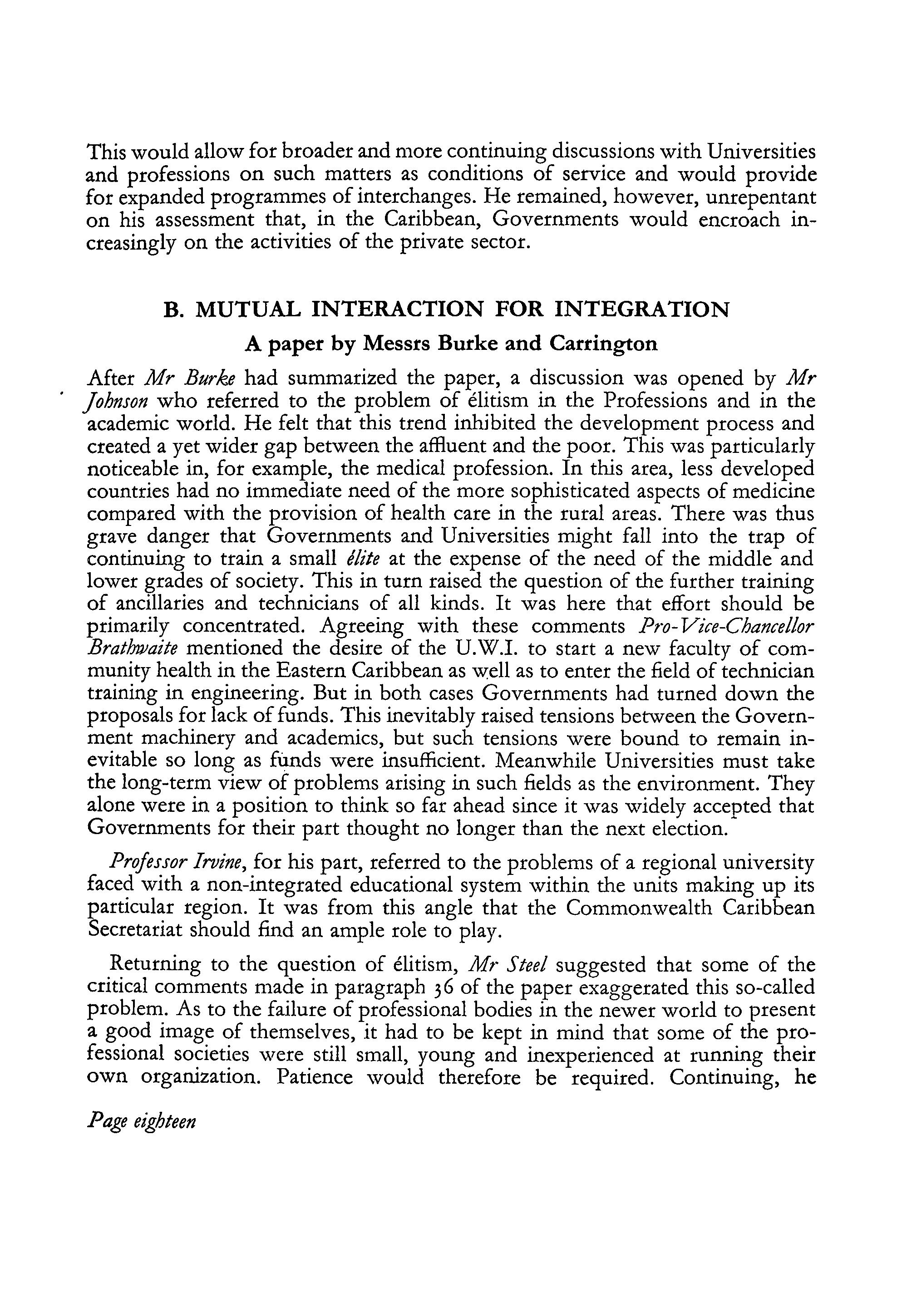
Page eighteen
suggested that there was no need for the distinction between straight-forward professionals and technicians to be blurred. Both aimed at different goals through different levels of education. But it must be accepted that it was the technicians who needed the greatest help from Government, the Professions and the University world alike. Sir George Cart/and said that all universities in the old and the newer world faced the problem how to tackle the training of the subordinate professions. Should it take place outside the university area, for example, in polytechnics or within? There was the further problem that once a polytechnic was created the tendency was for it to seek to up-grade its status to that of a university. Australia, for instance, was now thinking of training para-medicals alongside doctors in the university proper and it was his understanding that similar thinking or indeed courses on this joint basis were now being operated in a number of countries in Africa. Intervening, the Chairman remarked that medicine was a special case and quoted from the relevant passage from the report on the Sussex Seminar. In the view of Mr Burton, based on earlier seminars held in the Caribbean area, universities should become involved with training at advanced levels. The paper by Mr Burke did not take sufficient account of the integration of administrative services. There might, for instance, be a customs union within the area but so far there had been no move towards the inter-change of customs officers. It was essential to find means of promoting the movement of officers within the Commonwealth Caribbean at all levels. Otherwise the ideals of the Community would fail. Dr Macdonald asked himself whether universities should be responsible for, as opposed to promoting, lower level training. Quoting Sydney Smith - a university should be only those things, should do only those things which no other institution can do as well. He referred to the dangers of diluting efforts. It should not be necessary in this day and age to talk in terms of elitism - a pejorative phrase - when it was the proper task of universities to produce the country's elites. Dr Bonnic/e reminded the Seminar of the proximity of Jamaica to the North American market and to the effect that this produced on society, aggrai ating the problem of elitism and draining skills within the region. Another point related to the Government's attitude towards the universities. The idea seemed to be growing in relation to the development process whereby, in the name of development, the region could no longer afford the normal type of university and was beginning to insist on a multi-purpose institute concerned solely with development problems. This tendency worked against all hopes of better interaction and distorted the true duties of a university. This in itself made interaction all the more necessary.
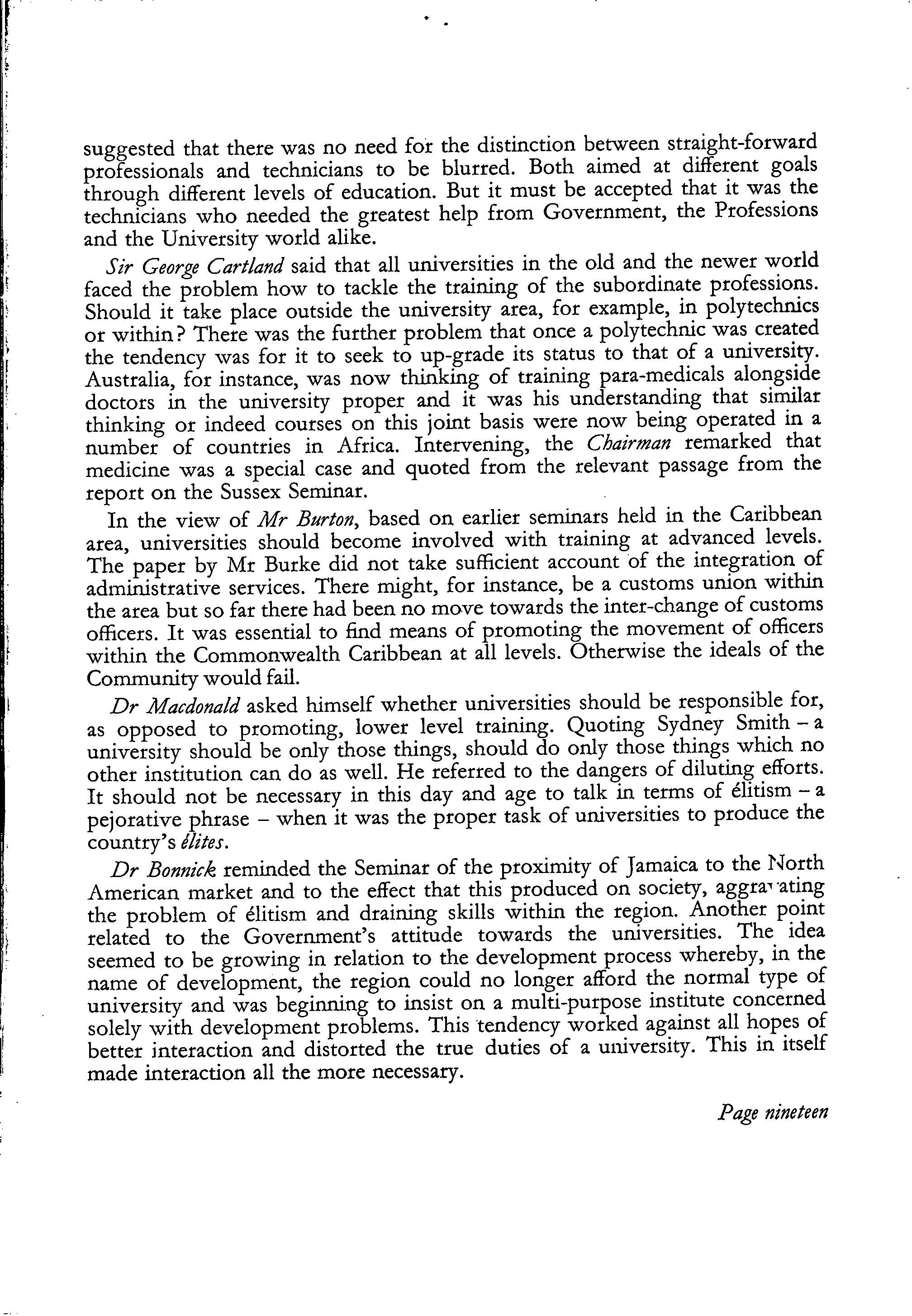
Page nineteen
Speaking from Ghanaian experience, Mr Adu explained that universities in his country were in fact training the sub-professionals. Considerable experience had been built up in Ghana regarding diploma courses for engineers, horticulturalists, social service workers, hospital administrators, public administrators and in the fields of music and drama. But this extension of university activities had not in any way affected normal standards. There was, furthermore, experience building up in his country as the result of academics and professionals being brought on to policy planning committees and into central banking activities and the like. The academics had from his experience become 'sober and imaginative administrators'. The Civil Service in Ghana had also drawn academics, notably lawyers and accountants, into boards and corporations. Such experiments had proved of real value to both sides.
Sir F. Phillips mentioned that on prestige grounds alone every country, however small, sought to draw its staff from within its own boundaries. But there was advantage in overcoming nationalism through the exchange of civil servants between larger and smaller territories. Regarding paragraph 37 of Mr Burke's paper, which referred to the efforts of professionals to improve their image, he would mention as a lawyer himself the work of the Organization of Commonwealth Caribbean Bar Associations and its study on a proposed Caribbean Commonwealth Court of Appeal. This was merely to underline how active the legal profession throughout the Caribbean had been in co-operating with Governments and Universities.
For his part, Prof. Martin said that the U.W.I. was not averse to the training of ancillaries. The point was that many of the smaller territories were strongly of the view that technical education should form part of the national task. It was easier to inject funds nationally than into a regional university. There was also the danger of a university building up an unnecessary empire in its efforts to provide for training at sub-professional level. Here Caricom should be able to help by advising both Governments and Universities what type of aid could best be given at this level of training and by whom. There was also a need for national as well as regional surveys in the training fields. Furthermore, studies were continuously necessary on the problems of movements and inter-change which would involve the preservation of promotion prospects, salaries, pensions and the like.
Referring to the deployment of scarce manpower resources Dr Soper inquired what was meant by 'the State' in the paper from Mr Burke. How far did development of regional co-operation improve the deployment of resources or, on the contrary, how far did it worsen them by creating yet a further layer of need?
Turning to the involvement of Universities in sub-professional training, Mr Griths instanced the success of two Universities in developing countries Page twenty

which had been designedly created from the Outset to cover education at the diploma level. In one of them for instance, 90 per cent of the students, many of them working part-time, were studying for sub-degree courses. At the other extreme in Britain, it was now difficult to forecast what the university's role should be in middle level training. On the one side, the University was in competition with polytechnics over part-time technical training. The conclusion seemed broadly to be that differing countries would have to find different solutions to their individual problems. But the more underdeveloped the country the more necessary it became to seek high-level qualifications - not necessarily at a level which would be automatically given international recognition. That in itself would avoid some of the brain-drain traps. After outlining the grave economic problems which the non-oil world faced and which would involve a radical restructuring of economies in the old world and the new, Prof. Jol1'y singled out four areas of specific activity which would require urgent treatment by Governments, Universities and the Professions alike.
First, training courses at universities as well as textbooks on economics would require much re-thinking and revision. - Second, all three sectors of the community would have to prepare themselves for the introduction of training courses of a practical nature related to shortterm needs in the areas of negotiation, e.g. in relation to Government negotiations with multinational corporations. Third, there would be an increasing need for international exchanges related to the above topic - particularly as between third world countries. The recent failure on the part of the latter to exchange views and experience in the course of negotiations on bauxite prices was a case in point. Fourth, in the area of research, universities and other groups would find an increasing role to play, e.g. in regard to mineral resources in Africa. Experience showed that companies with which Governments were negotiating preferred to sit across the table with people who were well informed rather than to face the uninformed and thus suspicious Government negotiator. Fifth - lawyers, accountants, etc., would find key roles to play in the new-style negotiating process with which the non-oil world was now faced. It was a question how far present training geared them to perform their duties in a world economy which was of necessity in the process of radical re-structure. Prof. Robinson went on to describe Jamaica as a 'two-risk economy'. A little reflection showed that high standards of services had to be developed in the island, first in relation to the tourist industry and secondly to satisfy the demands of numerous Jamaicans who travelled to the North American Continent and Page twsntj -one
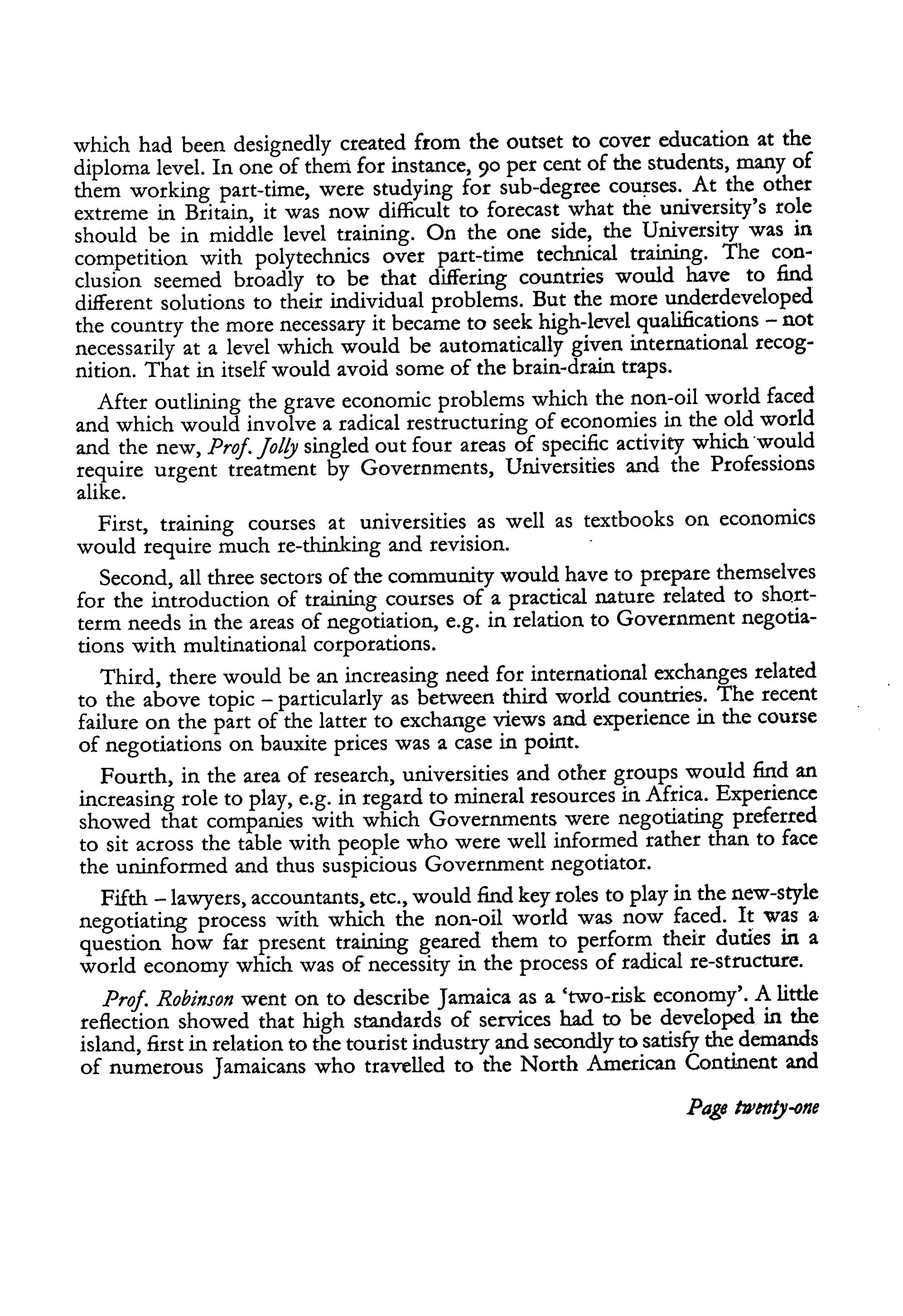
returned demanding better standards in all fields of life. Going on to mention the medical brain drain, Prof. Robinson suggested that the developed world was not fully facing up to its own responsibilities through failure to step up the home-trained intake to its own medical schools. There was, moreover, pressure on the U.W.I. to loan staff to non-campus territories. A recent survey on the Mona Campus showed that 5 per cent of academic staff were currently away from the University. Most of these people were key trainers and teachers and their absence inhibited the further training of those students whose skills would soon be solely needed in the less developed countries of the area. The dilemma for the University was whether to continue to respond to the pressures for the loan of staff from Governments who often offered far more attractive salaries, or whether at the risk of upsetting the integration aims some brake would have to be put on the secondment of university staff.
Dr Symons suggested that there should be further exploration of the problem of the migration of skilled manpower. It had now reached such proportions that it should really be tackled on an international scale. The brain drain and the availability of highly skilled manpower were in fact the common denominators of the Seminar, affecting as they did the State, the universities and the Professions. It was a matter of shock and surprise that 50 per cent of the doctors currently licensed in Canada were non-Canadians and 25 per cent of these came from the Commonwealth. It would seem, therefore, that a new form of economic exploitation had developed. This was unfair to both the developing countries suffering from the brain drain and to young Canadians seeking openings in the medical field in their own country.
At this point, the Chairman interjected his doubts whether the developed world should feel any sense of guilt at this type of development. There were advantages to be gained by those from the developing world through overseas experience. But in any case, specific solutions would have to be found to specific individual and country cases. There was need above all to provide the professional man in the developing world with the necessary underpinning of ancillaries. This would be one means of placing a brake on the current brain drain.
Referring to the remarks from Dr Symons, Dr Macdonald suggested that two problems arose in Canada on the medical front. One related to overseas students coming to Canada to graduate; and the other to already qualified professionals coming to practice (the latter proved an attractive and economical investment for the receiving Government). Basically, the question was whether one could more easily restrict the movement of the highly qualified professional man than that of the ordinary unqualified man in whose path no obstacles to migration were placed. Canada was, however, looking afresh at the matter of placing young qualified doctors, engineers, etc. It no longer seemed
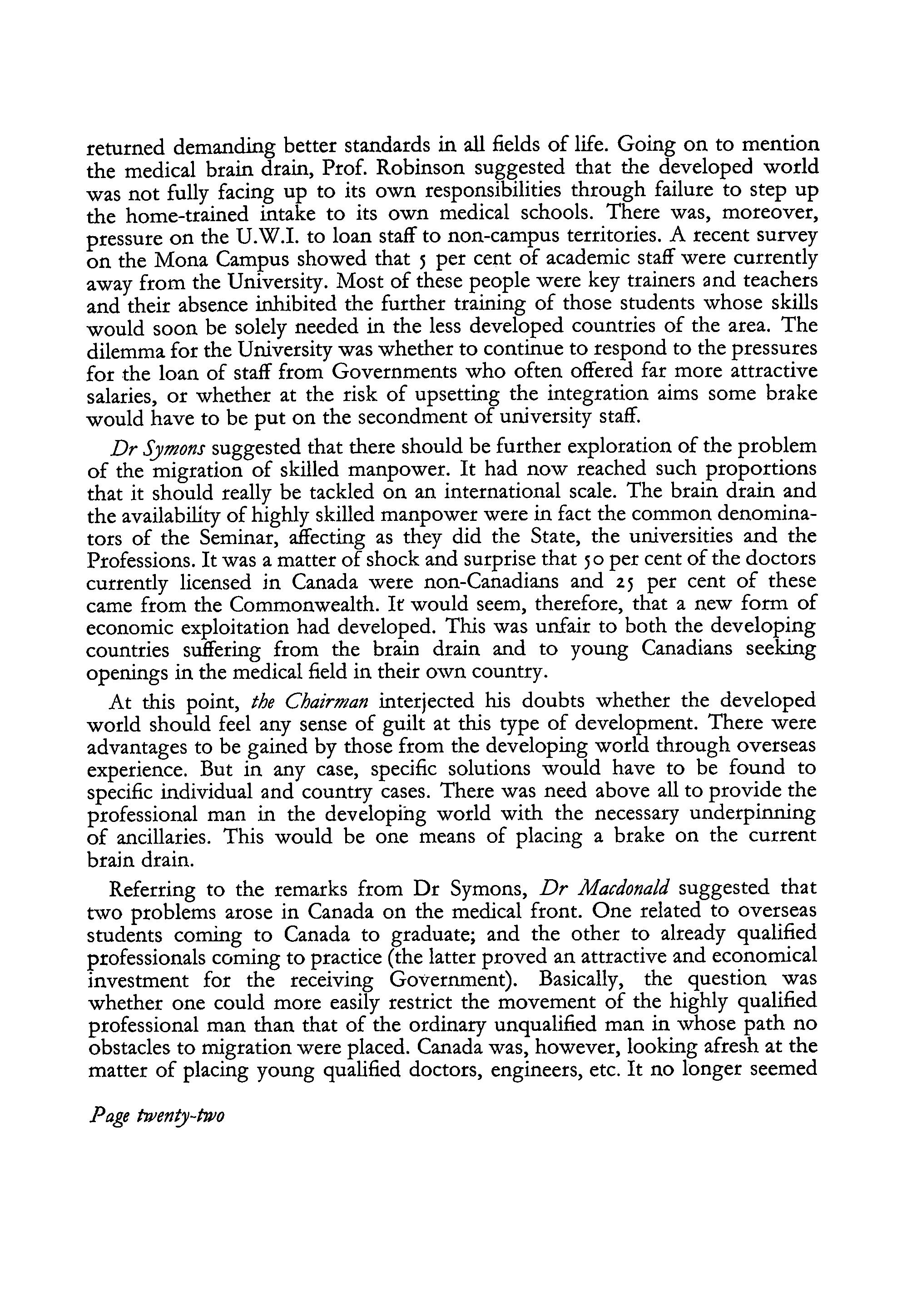
Page twentj-two
reasonable to allow complete freedom of choice at the start of his career to an expensively State-financed graduate. Thus minds were turning to the thought of bonding young graduates so that they would be obliged to work for up to five years in areas of need rather than in the big cities. Possibly, this policy could be adopted with advantage in the Caribbean. Speaking from his experience in Singapore, Mr Leong referred to the problems faced by those in private professional practice in endeavouring to influence Government planning and the development process. Through failure by Government to consult the professions at a sufficiently early stage, the economy lost the benefit of their advice. This might partly be the fault of the professions themselves. But it had to be kept in mind that the office bearers of professional associations were quite often senior civil servants themselves who, for obvious reasons, did not wish to offend their Governments. His question was how professional man should, in the circumstances, behave. Mr Murray for his part agreed that it was for the Professions to take the initiative in moving closer to Governments. Sometimes Government themselves did take an initiative in bringing in the Professions and showed readiness to accept recommendations relating to, for example, the content of training courses for technicians. In time, Governments would be likely to listen more closely to the Professional Community, but this would be subject to the readiness of the Professions themselves to move in at an early stage of the planning process and to show that their motives were altruistic and to the benefit of the community. MrJohnson suggested that Government had the right to demand that graduates serve their community in return for the investment in their own education. On this point Mr Adzi mentioned that the Ghana Government had always required students from overseas as well as those locally trained to remain in Government service and under Government direction for the first five years of their career. They were bonded and had guarantors to that effect. Failing compliance or return from abroad, the bond became forfeit to Government. In the context of the brain drain, he suggested that developed countries should increase their own training facilities in national areas of critical shortage such as medicine. They might also think of re- structuring their aid to the developing world in order to supply increased local training facilities. Prof Irvine suggested that Universities and Professions should lay far greater emphasis on the social responsibility of professional man and that this theme should find a part in training courses. Regarding bonding and the brain drain, his conclusion was that while a Government might find it easy to keep a professional man in his own country it could not force him to practise. Page twentji-three
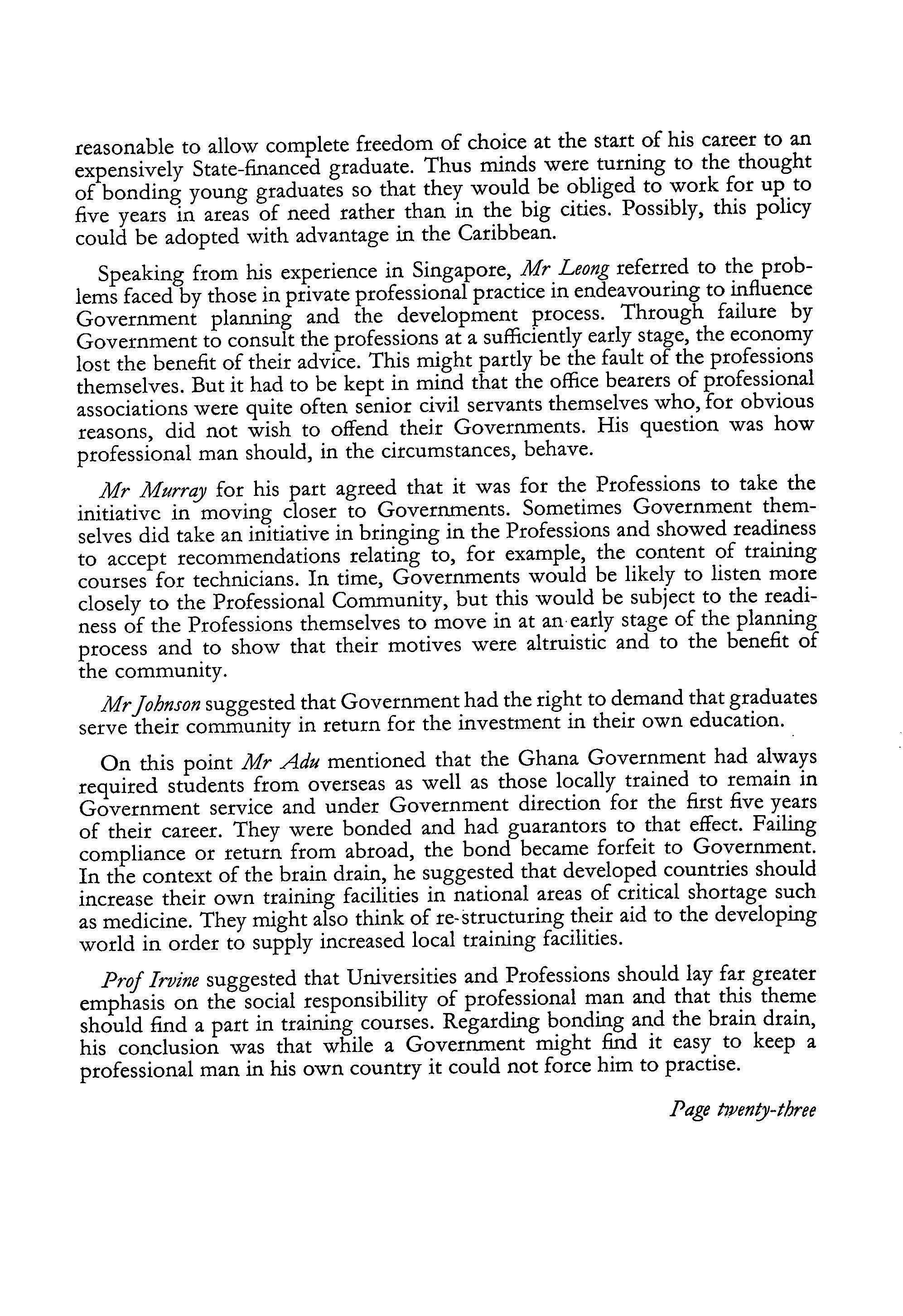
Continuing this debate, Prof. Robinson referred to the National Youth Service in Jamaica under which Secondary School leavers were required to give two years' service to the community. Graduates were exempt until the end of their University education from this duty, but there was increasing pressure to persuade graduates to begin their careers at least in the civil service under Government direction. For his part, Dr Arniel referred to the frustrations experienced by students returning from overseas. These included lack of immediate postings and an attitude of mind on the part of politicians, who had rarely trained as professionals, to the effect that the young expert must mark time and not seek to express opinions until he had served his passage for some years. It also made for despondency and a desire to return overseas forthwith when the young graduate saw his political leaders surrounded with foreign experts, the assumption being that the young indigenous graduate was incapable of tendering proper advice.
At the conclusion of the debate and on the invitation of the Chairman, Mr Burke iep1ied to the questions posed by Dr Soper earlier in the discussion. In referring to the 'State' in his Paper, Mr Burke had meant to imply the agency for implementing State policy, having available to it all the -skills within the country. As regards the interaction between national and international entities, his reference here was to the national entity, but 14 countries were involved in the Caribbean area and this alone showed that co-ordination of effort was required.
As regards the question of political cohesion, it had to be remembered that the failure of Federation was still fresh in political minds. There was no early way of bringing it back to life. Thus, Caricom could only proceed stage by stage by a series of functional steps involving economic, social and other types of non-political integration. It had, therefore, to be accepted against this background that there would in the shorter term of necessity be some apparent waste of manpower through the need to provide services through a nonpolitical and as yet not wholly integrating body.
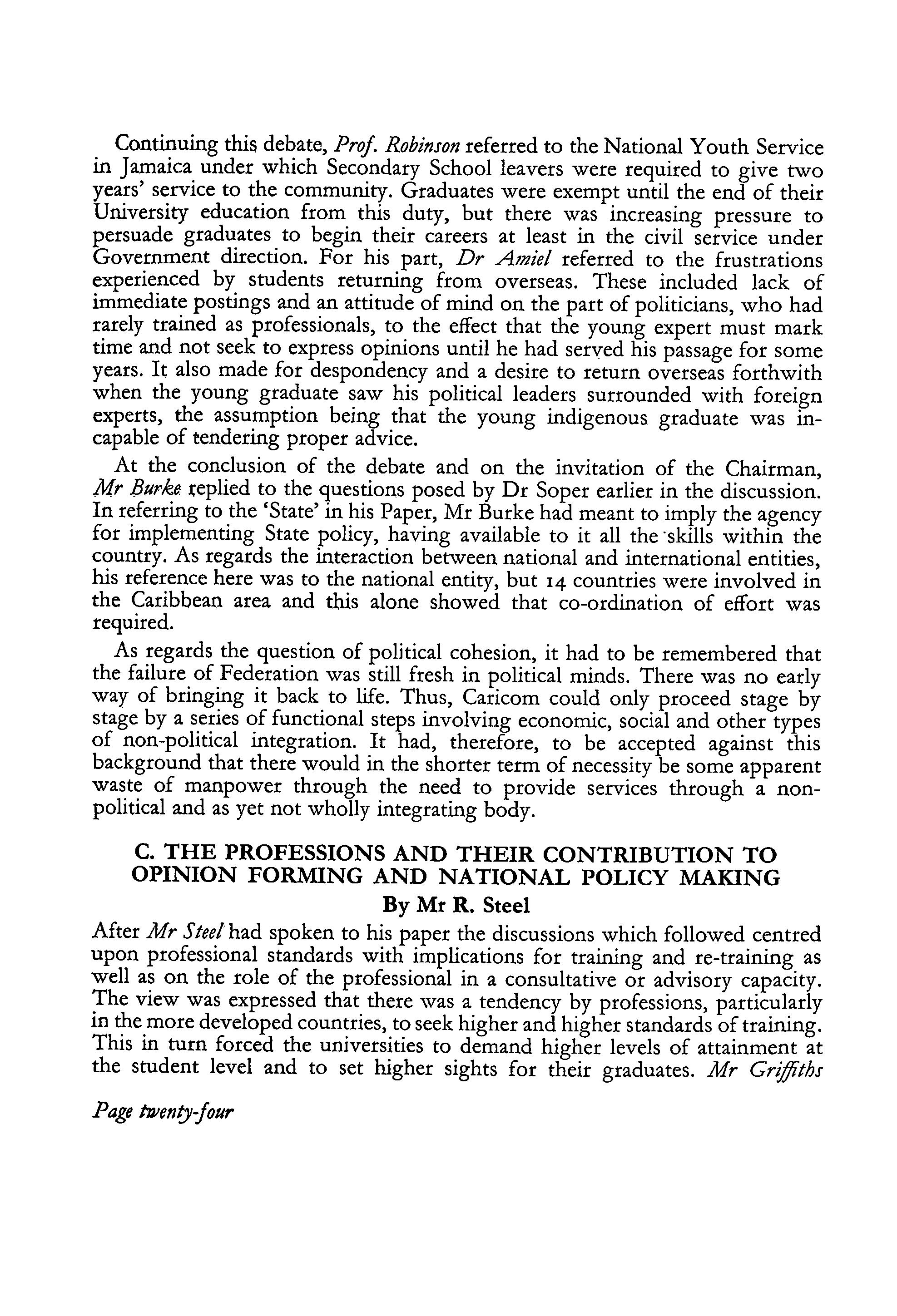
C. THE PROFESSIONS AND THEIR CONTRIBUTION TO
OPINION FORMING AND NATIONAL POLICY MAKING
By Mr R. Steel
After Mr Sleet had spoken to his paper the discussions which followed centred upon professional standards with implications for training and re-training as well as on the role of the professional in a consultative or advisory capacity. The view was expressed that there was a tendency by professions, particularly in the more developed countries, to seek higher and higher standards of training. This in turn forced the universities to demand higher levels of attainment at the student level and to set higher sights for their graduates. Mr Grffiths Page twenty-four
maintained that in recent years the professions had been doing much to force universities to push up their training standards. Dr Macdonald, from his North American experience, felt that professions did go through an evolutionary process. The current trend in training was to integrate rather than divide. Mr Adzi, in describing experience in his country, warned of the danger of a fossilization of standards. The number of professionals in newer Commonwealth countries was still inadequate. Yet these trained people were rigid in their demands for standards of training comparable, if not identical with, those obtaining in developed countries. It was most desirable that professions, civil servants and academics should together take a hard look at what should be the acceptable standard of achievement in the various professional fields. Mr Murray felt that the criterion for an acceptable level of training should be in terms of the needs of the country. In support, Mr Johnson stressed that in determining standards, one should look at the nature of the work which the professional would be called upon to do. Vice-Chancellor Cartland interjected that it might be of value to look at different ways of training rather than at extending courses. It was dubious whether there was more educative value in an extended course rather than in a more intensive course covered in a shorter period. Was it not better to know a smaller number of subjects well rather than to acquire a smattering of a large numbet? Prof Joliji wondered whether the solution was not a return to the i9th century method of training professionals whereby actual on-the-job training was interspersed with academic studies. Mr Steel was of the view that professions should in no way try to impose educational standards on the University. Instead they should work closely with the Universities, first to determine the nature and volume of work to be done by the professional and only secondly to agree on acceptable standards. Prof. Irvine raised the question of the responsibility of professions to their sub-professionals, while Mr Ingram spoke of the danger of the gap between the professionals and the public. There was need for increasing dialogue between the professions and the media; otherwise there was the danger of alienating the public.
In support, Mr Steel expressed the opinion that the professions would never be effective in developing countries unless there was some understanding on the part of the public of the role and work of the professions. The view was expressed that in varying degrees there was already a great deal of consultation between the civil servants and professionals. Mr Adu told the meeting that in Ghana it was now a legal requirement that in order to practice, professionals must not only be registered but also be members of their professional organization.
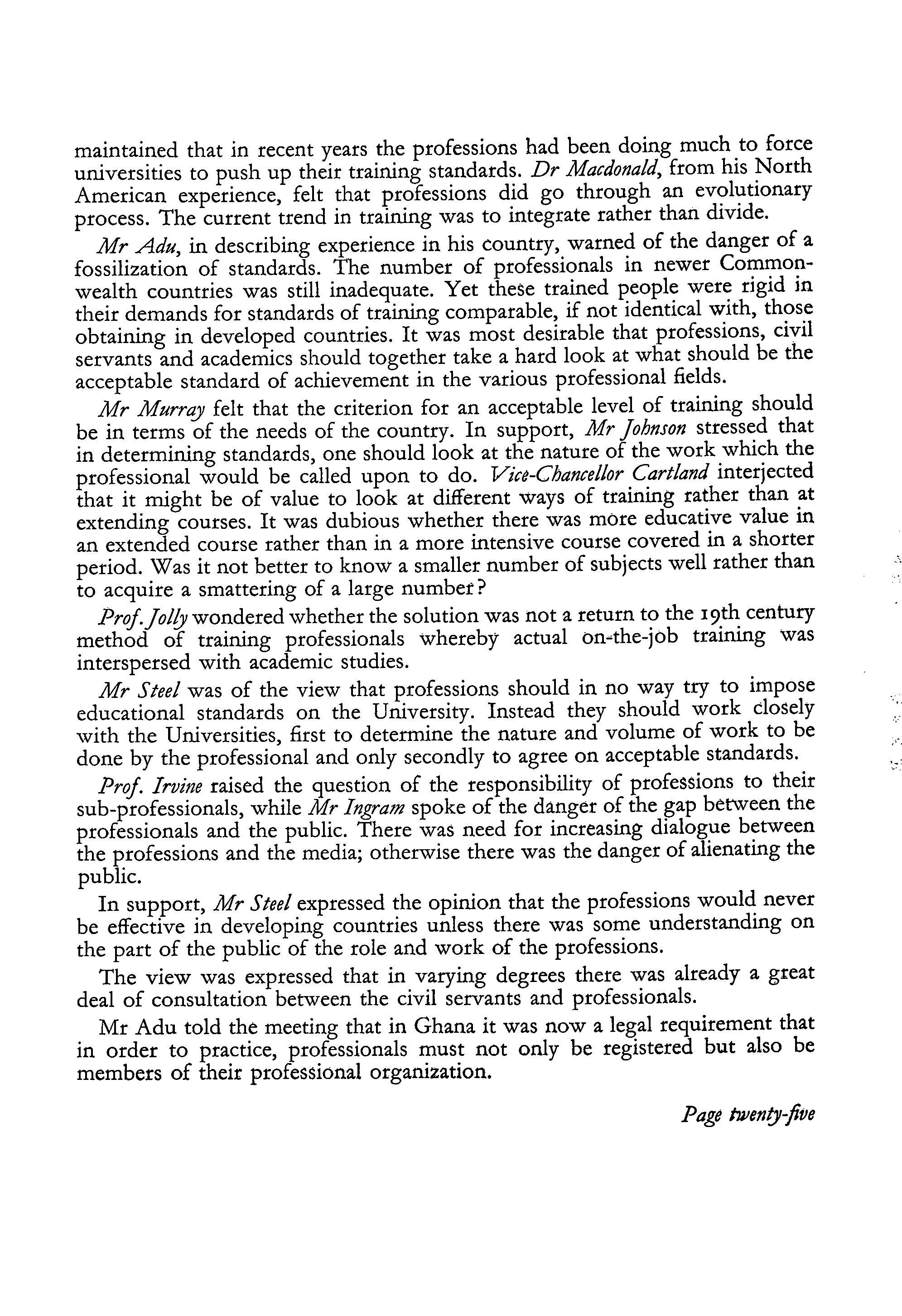
Page tweny-five
D. RELATIONSHIPS BETWEEN THE PROFESSIONS AND
THE UNIVERSITIES by Dr J. B. Macdonald In the discussion following the presentation of this Paper, Mr Steel suggested that the picture painted of the situation in the professional world was not always relevant to countries outside North America. The critical comments made by the key speaker were quoted primarily from American or Canadian sources and were directed chiefly at the fields of medicine and law. Admittedly, professions in the North American area operated chiefly as pressure groups. But this was not the case in Britain and elsewhere in the Commonwealth. So far as Britain was concerned, the public itself was protected under Royal Charters granted to the professional bodies under which the prime objectives of a professional society were described as the advancement of knowledge and the good of the public. Mr Steel went on to say that he was troubled by some of the broad conclusions at which Dr Macdonald had arrived, based on assumptions which to him seemed narrow. A reference, for instance, to the health services in Quebec would be quite irrelevant in so far as engineers, surveyors, accountants, etc., in Britain were concerned. Those bodies did not, in any sense, operate through a closed, monopolistic shop. They were not registered bodies and members of the professions concerned were in no way obliged to belong to their particular professional association. In Mr Steel's view, registration was only effective if it proved to be in the public's interest. Concluding, he remarked that the Monopolies Commission in Britain, while critical of some limited areas of the professional world, had found nothing fundamentally wrong with the professions themselves or with their conduct or relationships with the community.
At this point, Prof. Irvine having referred to the importance of Universities, Governments and Professions acting in the public interest went on to inquire who, in fact, defined what the public interest was? Was it the task of politicians? If not, with whom did the duty lie?
Sir George Cartland following on from this intervention emphasized that basically the aim of the Seminar was to inquire into the question how best the public interest was served by Governments, Academics and Professionals alike. It would be interesting to debate how the interest of the public was to be assessed; whether public relations units should be employed by the triad referred to, in which case a useful three-way traffic could be developed.
For his part, Prof. Jolly referred to the danger of going to extremes in endeavouring to define within differing types of regimes who or what represented the public interest and through what particular means. Truth varied as between differing types of Governments. It was also dangerous to accuse Universities and Professions of acting solely in their own interest. The real dilemma was
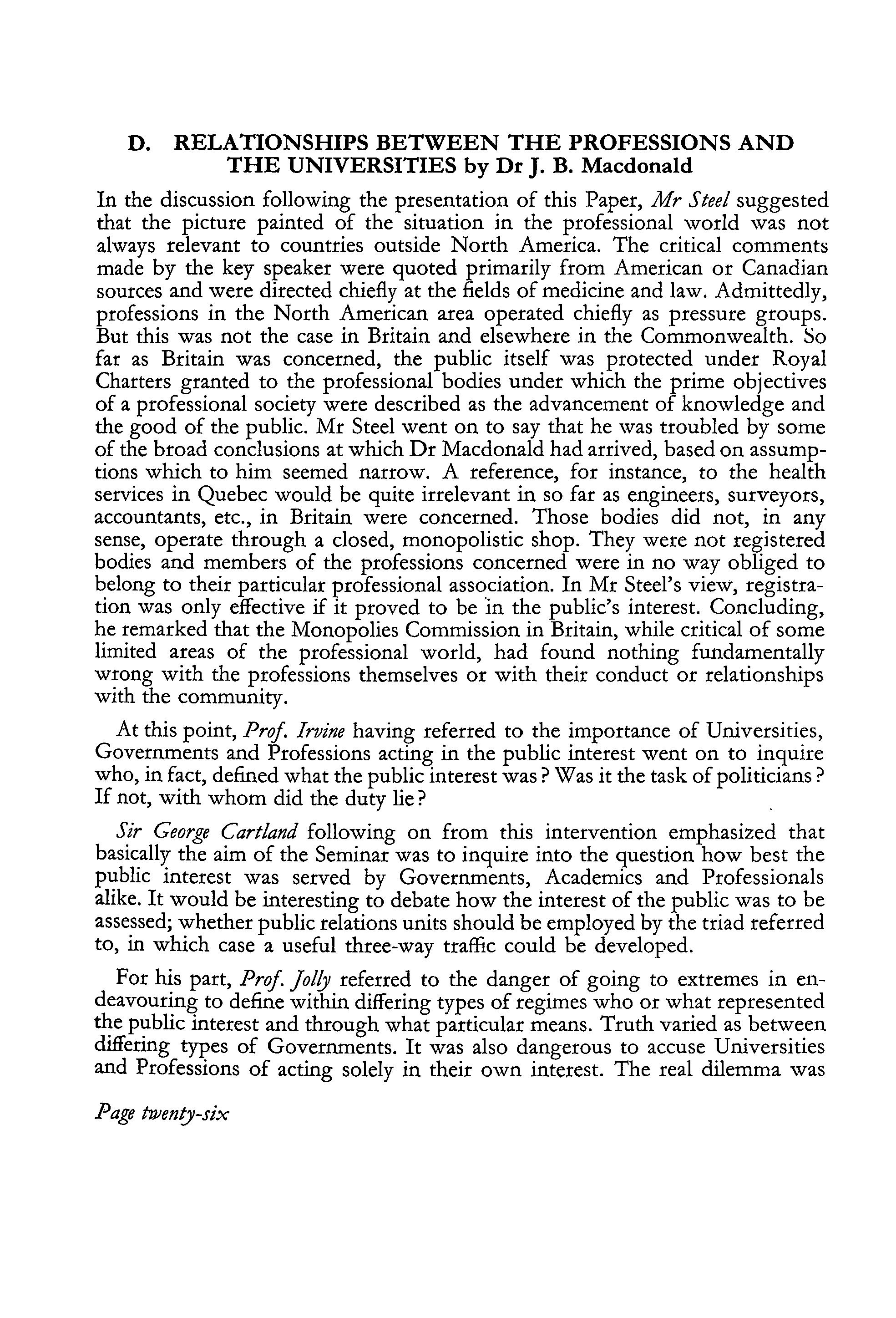
Page hi'ent'y-six
how the public itself was to become involved in matters affecting its fate. Among other matters it was interesting to see from Dr Macdonald's Paper that Universities faced the same tensions and problems as did the Professions. Dr Farrer-Brown suggested that what distinguished a Professional man from others in the community was the special relationship of trust based on acquired skills between him and his client. This was essential in building up and retaining public confidence in the Professions. As it was all three groups involved in the Seminar were engaged in the use of knowledge in the human interest. This alone should make for closer co-operation between members of the trilogy. Prof. Robinson suggested that the Paper was not positive enough as to how Universities and Professions could put their respective houses in order. Who, for instance, imposed consultation of the public interest by Governments, Universities and Professions? Who provided the opinion for the public, say in relation to tenure of appointments at Universities? Should lay members of the community serve on University appointments Boards? How would such people be chosen and what particular public interests would they in turn represent? Replying to some of these points, Dr Macdonald emphasized that no one individual had the right to define the public interest. Within democracies the public interest was not a fixed point on any issue at any time. Values changed and had continually to be re-assessed. Through this process, one might well arrive at a concensus from conflicting views and values expressed, for instance, on problems of the environment. Good leadership consisted in part of an ability to sense the consensus. Thus his own plea was for the creation and gradual broadening of task forces concerned with the identification of problems involving the public interest. Such task forces should include members of the professions, Civil Servants, Universities and Industry involved in the planning process who should be ready to tender impartial advice to Governments. Continuing Dr Macdonald said that within Universities the same basic problems arose. How they were resolved depended partly on how faculties protected themselves, partly on how the University was governed. As to outside advice, it would seem desirable to draw on graduates no longer within the University field; on practising Professionals and on those persons of eminence in the lay areas who held contentious views. Indeed laymen should be welcomed as members of University Boards since they could add fresh viewpoints and broaden the thinking of all bodies on which they served, thus ensuring that the whole community was represented at the stage of decision-making. Mr Henry suggested that, in the final analysis, the only body able to interpret the public interest was the Government. Thus the more sensible and outward Page twenty-seven
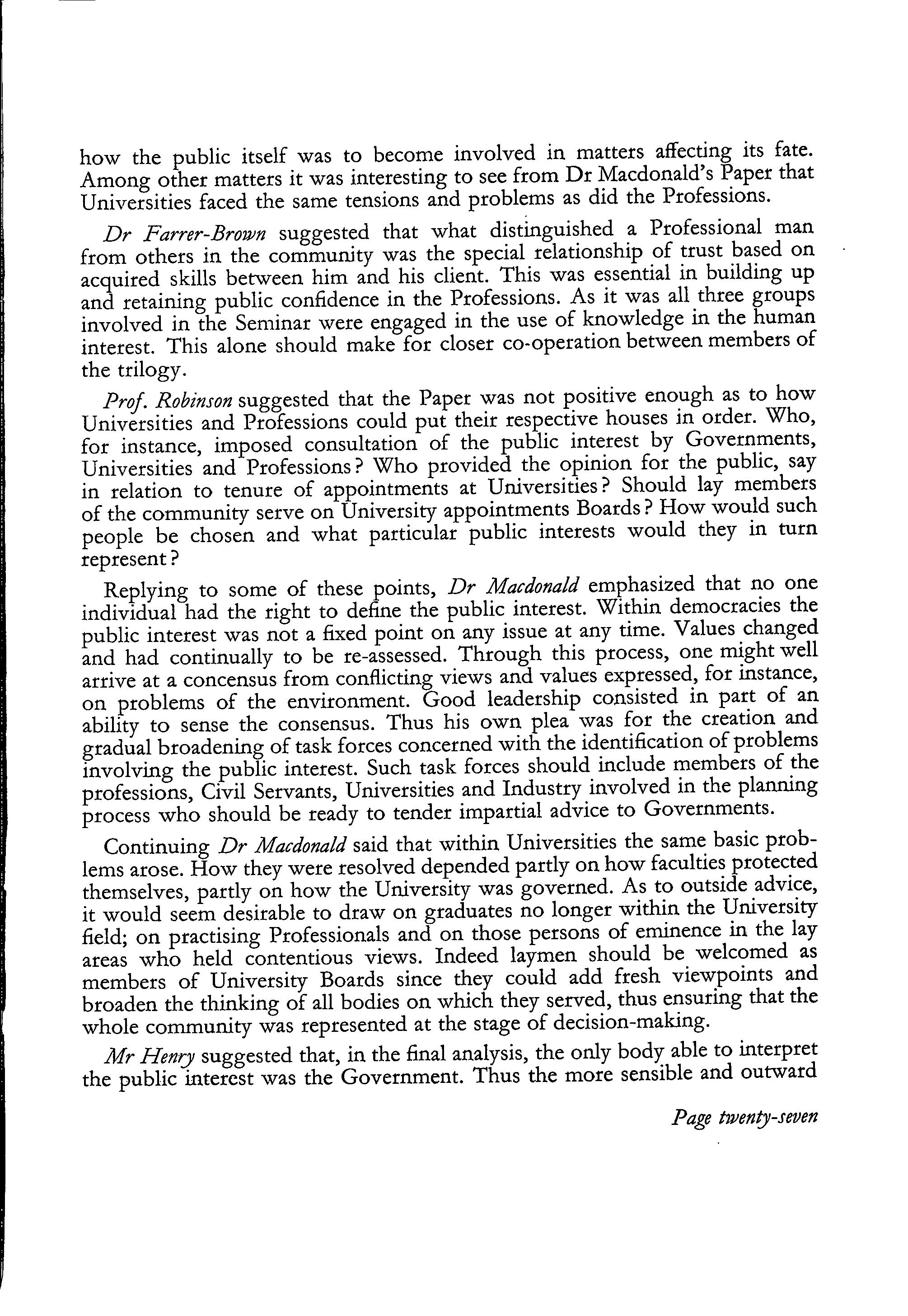
looking professional bodies and universities were, the less likely was the risk of government interference in their affairs. The dangerous problem areas were those in which the professions were seen to be sitting in judgement on their own members or where, for instance, they excluded students on social grounds alone. In cases of this kind, Governments might well be forced to intervene to correct injustices. Meanwhile it was salutary to see the Seminar examining and criticizing itself in terms of its membership of Governments, Universities and Professions alike. At this point Dr Macdonald intervened to say that the Government in the circumstances described by Mr Henry had two choices: either to intervene directly or to ensure that the structure of the offending organization was changed in such a way that such evils could not again occur.
Mr Murray suggested that it would be difficult indeed to find general answers to all the dilemmas discussed, for example, that of registration. In the last resort, Governments had to decide how far a Profession should be allowed to control itself. Clearly, Governments could not afford to allow the Professions to get into a closed shop state.
Sir E. Richardson for his part endorsed the greater part of Dr Macdonald's replies to criticisms made. Universities and Professions must simply respond to requests from the public to be allowed to sit on Advisory Boards as junior partners representing sections of the community. He made a distinction between Governments and Parliaments. In the latter case, there was one practical problem facing the public servant whose horizon was limited by acts of Parliament: namely how the average M.P. could be advised of public opinion on a particular Bill. It was well known that M.P.s were jealous of seeing civil servants intervening between them and the public. Thus one might explore how Universities and Professions could help in ensuring that an M.P. was properly informed on some matter affecting the community at large. Professional bodies must of course bring members of the public into their own opinion-forming processes. But they might take matters one stage further by inviting M.P.s to receive delegations or information so that knowledge and the necessary background material to pending legislation could be received by the M.P. who would then be better able to help Parliament in reaching an informed decision. Sir Egerton's conclusion was that relationships with Parliament posed far greater problems in, for example, the Caribbean than they did in Britain.
Dr Symons expressed his entire agreement with the previous speaker and with the need for better representation of public interest in University affairs. The question was how to set about the improvement process. Who was to select the members of the public to serve on University Boards and how? If appointed by Government then the risk arose of political intrusion and of a further extension of bureaucratic control. Government itself was a self-protecting unit. One might thus end by serving the interests of a political party rather than of Page tweny-eight

the community at large. This in turn brought with it the risk of Government patronage. Indeed, such dangers had already arisen in newer Universities in certain of the Canadian provinces as a result of Government nominees sitting on Appointment Boards. The results had been peculiarly unhappy. The danger of political bias in respect of both University and Professional appointments must be continuously watched. In short, one faced the risk of creating a graver problem by trying to solve the existing one.
For his part, Mr Ada said that there was one particular issue not perhaps fully brought Out in Dr Macdonald's Paper; namely the effects of the British academic and professional heritage on many former dependencies. It was not necessarily transplantable and, while it affected only the minority of the highly educated in the community, it was difficult to employ it through those conventions of checks and balances which had been built up in Britain over many generations. Thus, what was needed was to see how the principles, which all would applaud, could actually be made to work in differing sets of circumstances. The Commonwealth contained a wide range of differing political systems. In Ghana, for instance, apart from those outsiders selected by Governments to serve on University and Professional Councils, the latter were now themselves looking for further laymen of distinction of their own choice.
Quoting The Times to the effect that 'Doctors in the UK were the miners of the middle classes', Dr Soper asked how non-Governmental Organizations could now best cope with the increasing, but not yet total Government power. It would be an illusion to assume that Britain today remained in the traditional state of democracy in which it had so long lived.
Prof. Brathwaite added the thought that universities in the Caribbean had so far failed dismally in their efforts to get public opinion on their side. To this, Prof. Robinson added the failure of professions in the area to inform themselves on matters of public interest lying outside their immediate field. He suggested that the Professional Centres sponsored by the Commonwealth Foundation might themselves identify issues of this kind and then aim to educate the various Professions themselves as to the problems with which they should be concerned.
Replying to the debate, Dr Macdonald said that the trilogy under discussion was not in practice a series of monolithic establishments. It was in some countries merely more homogeneous than in others. One of the major problems arising was the conflict of interest from within the trilogy. It was perfectly proper for a Professional Body to promote its own interest frankly. This was far better than masquerading as doing such things for the public good. He was impressed by the value of the Monopolies Commission as described by Mr Steel, but saw it as a supplement rather than an alternative to ways of
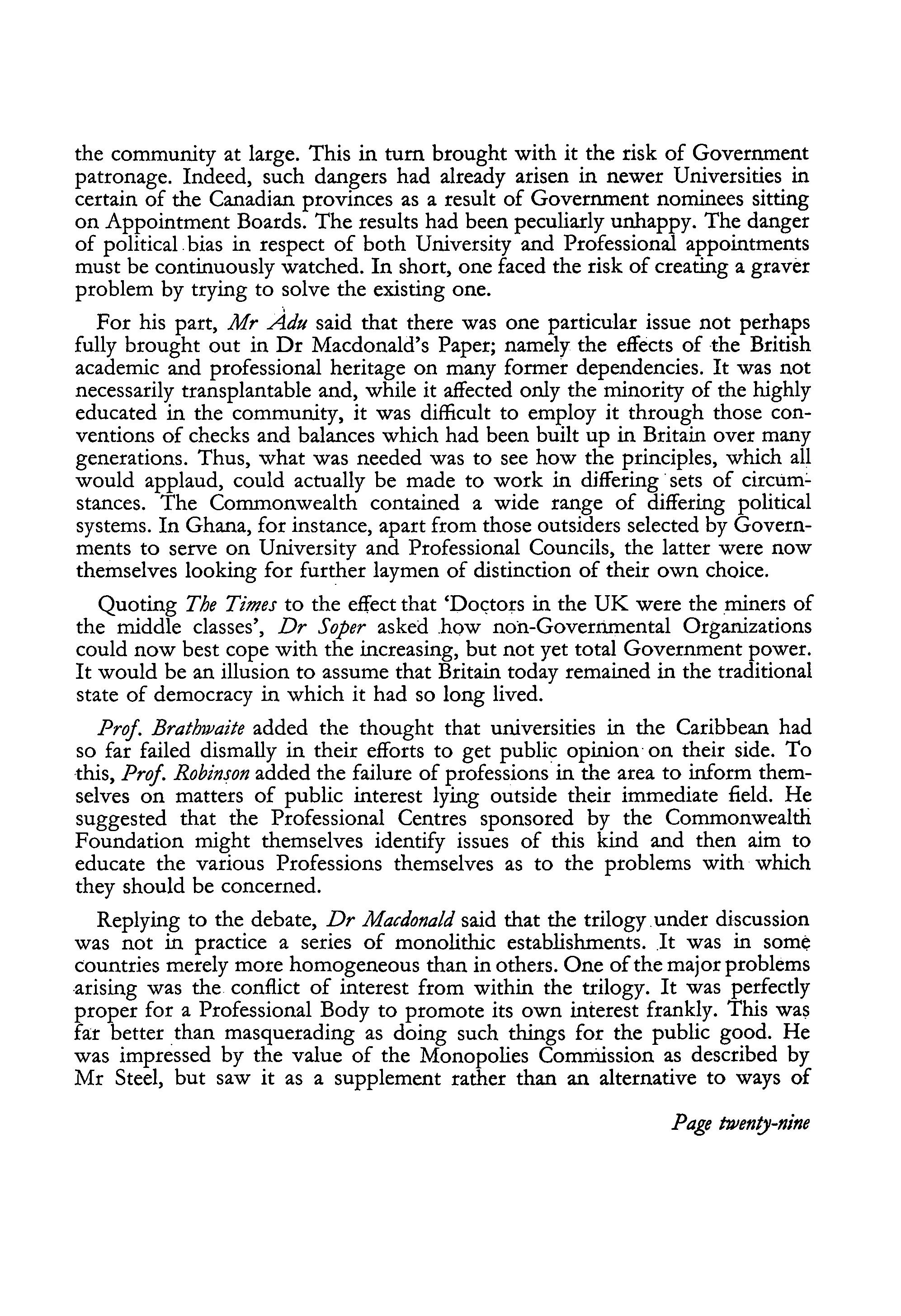
Page twentj-nine
improving the Professional image. He also accepted Mr Adu's remarks as to the difficulty of transplanting elements of the British heritage. As to ways of keeping M.P.s informed, there was indeed a generally felt need for group involvement on problems affecting the public interest. Such groups, whether from Universities or Professions, might think of inviting M.P.s to sit as observers on their own committees and councils. This would make generally for far better informed parliamentary opinion.
Following a presentation by the Director of a summary of the seminar discussions to date Prof. Jolly said that it was necessary to strive for further representation of the public interest. The Civil Service was not necessarily an unbiased body. Such points should be emphasized in the final report. It would also be useful to have some mention of the international issues of the day and Their impact on the trilogy. There were also direct implications for the strengthening of regional as opposed to international activity. Mid-career training would in turn be affected by important international issues.
Vice-Chancellor Cartland drew attention to some omissions in the Director's summary which did not take sufficient account of the role of universities. The final report must be clear on definitions, e.g., the distinction between Civil Servants and Governments; between universities and their individual members and between public opinion and public interest. It was essential to see civil services, universities and professions in their proper context.
There was a function for universities in training. The gap between training for public administration and for business administration needed to be narrowed so that joint studies could be carried Out. Secondly, there was a need to understand the nature of the advice that universities could give. Academics tended to get problems of the wider world out of proportion. Here, the Civil Servant could help by taking the balanced view as between one specialist and another. As to the role of a university, involvement in public policy was not necessarily its prime task. A longer term one was to be the guardian of national culture and the safeguard of the whole range of knowledge. Such tasks should not be overlaid by short-term issues. Other concerns of a university were with higher •and mid-career training for the longer term.
As to relations between universities and the professions, one must not overlook the fact that universities were also concerned with the training of generalists. This was of particular importance in relation to the impact of public opinion. From these remarks Sir George Cartland went on to inquire whether there was a general service duty on universities other than teaching and research. How far could money be used on more general purposes in order to carry out duties to the public; for example by loaning staff to government bodies at a financial sacrifice? The question indeed arose whether universities were entitled to charge a fee to government for such services. Page thirty
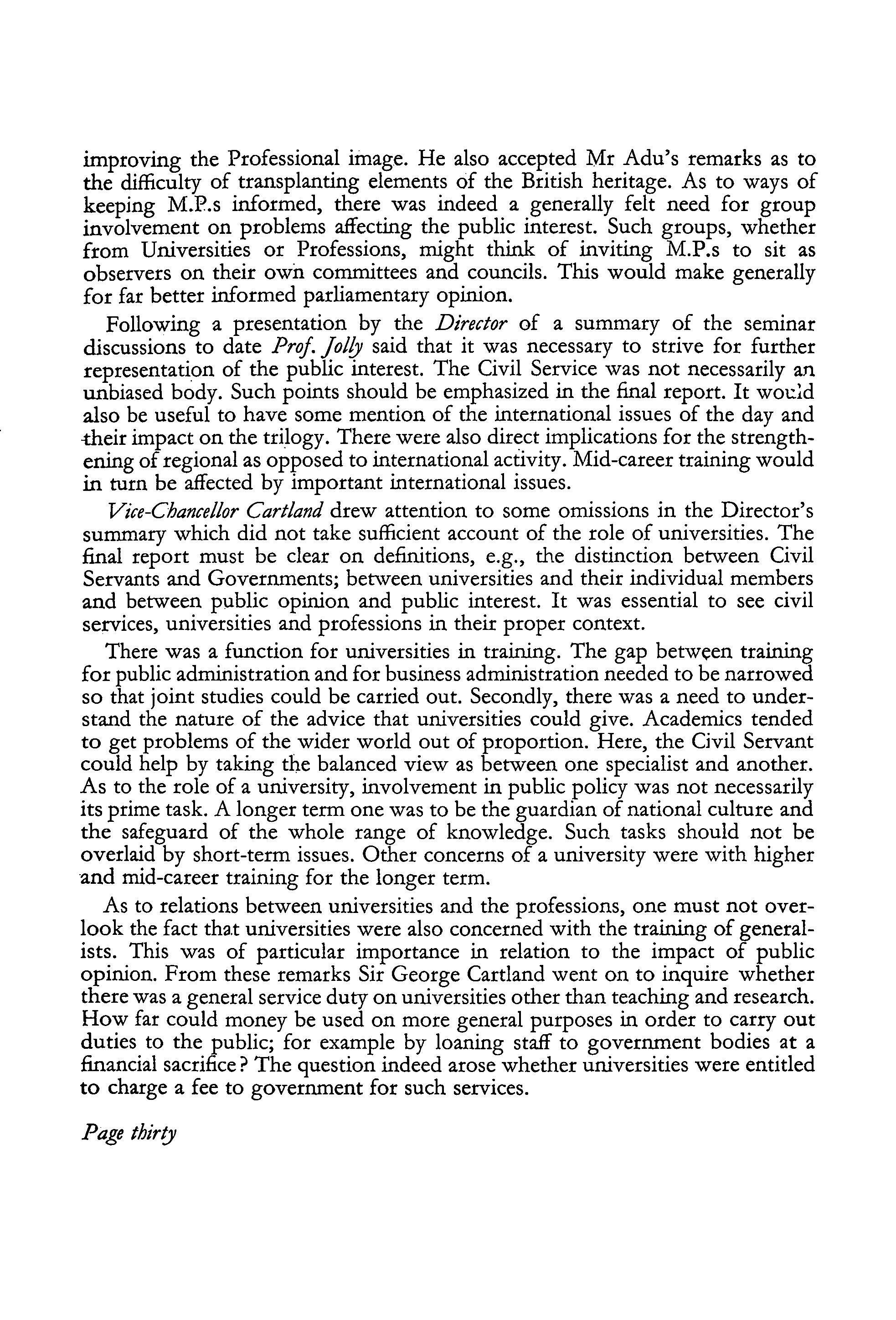
Referring to the supply of professional manpower, Mr Steel expressed the need for closer collaboration between universities and professions. They would have to get much closer together on manpower studies, courses, problems of recruitment and the filling of research gaps, e.g. as to the application of basic skills to basic problems. There was great need for mid-career updating and admirable opportunities here for university co-operation. Both sides needed to urge governments to make proper use of the skills available to them.
As to mid-career training, Dr Soper said that Civil Servants should be given a chance to get the feel of the business world, particularly in relation to international finance. They should be able to study such matters as investment flows, multi-national corporations, etc. through institutions and organizations. The Plowden and Duncan reports had already made recommendations regarding the involvement of British civil servants in trade questions. But international finance was now of immense importance and there would be great benefit in posting diplomats in particular to finance institutions as stagiares rather than as trainees on a course.
Dr Symons referring to the brain drain suggested that the problem should, above all, be tackled from the angle of the use made of highly qualified manpower. This was a key link between the trilogy. Areas which could profitably receive attention in future in this context were first, the collection Of more data; and second, an attempt to find comparable bases on which such data could be assessed. The whole problem would be a profitable one for study and collaboration in a Commonwealth context in a broad search for a common policy. He then recommended a Commonwealth seminar on the subject as a step towards the presentation of recommendations to governments for consideration at a larger conference.
Mr McCombs pointed out, however, that quite minor changes in the national economic climate could easily throw manpower calculations out of gear. To this Mr Steel added that political decisions could bring about the same effect. None the less, it was agreed that manpower planning studies would have to continue, however uncertain the future was.
Summing up the discussions, the Chairman then referred to the possible outcome of the seminar. It was clear that there was a wide range of circumstances in which all in the Commonwealth lived in the aftermath of the British heritage. Substantial vehicles for inter-action already existed. Yet, inter-action between governments and universities on the one hand and between them and the professions on the other were not sufficiently advanced. Here, the Commonwealth Foundation's efforts through associations, centres and seminars should help to speed up the process. The Denman report on land economy in the Caribbean was an excellent case study example of how things could be advanced
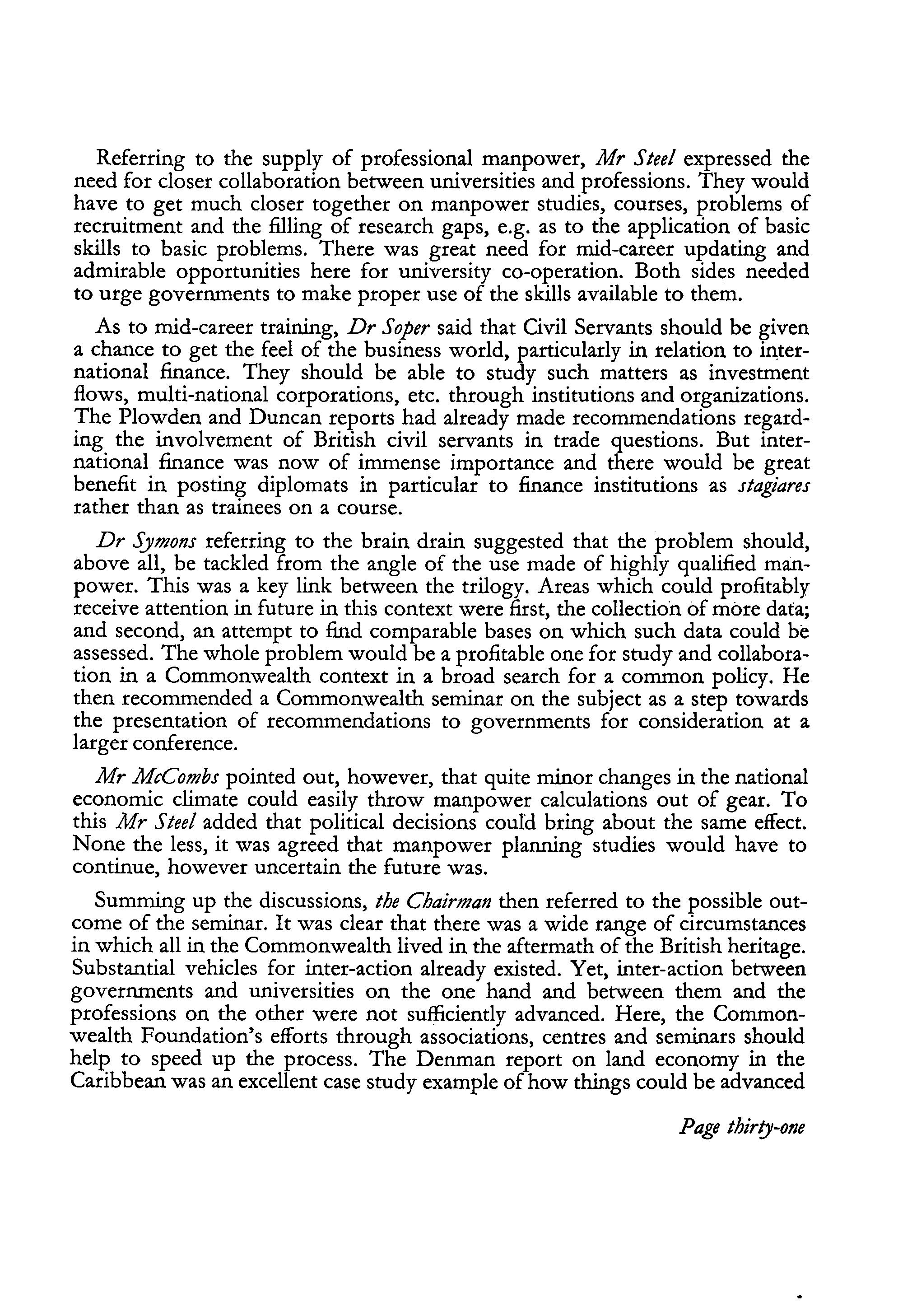
Page thir'y-one






